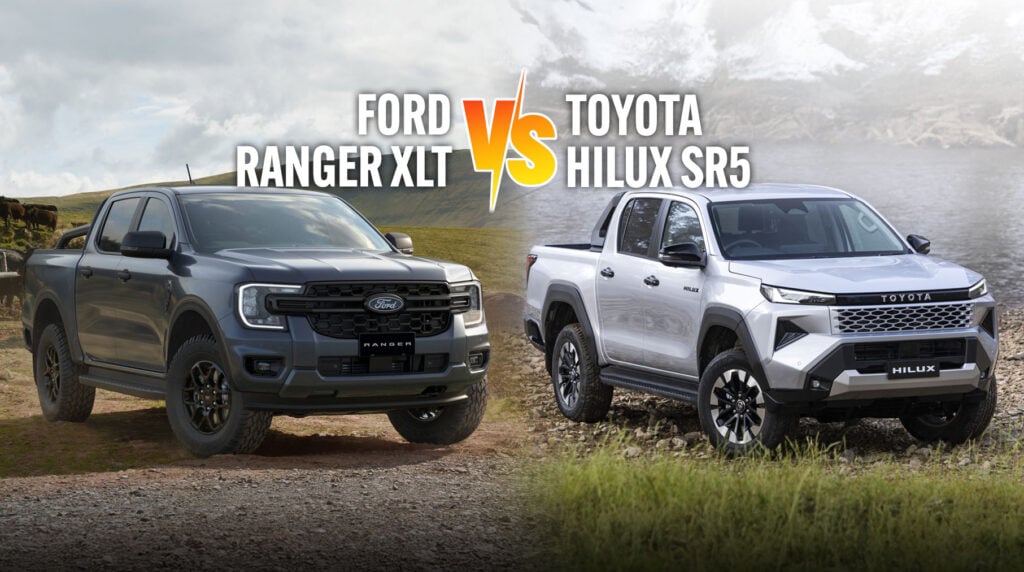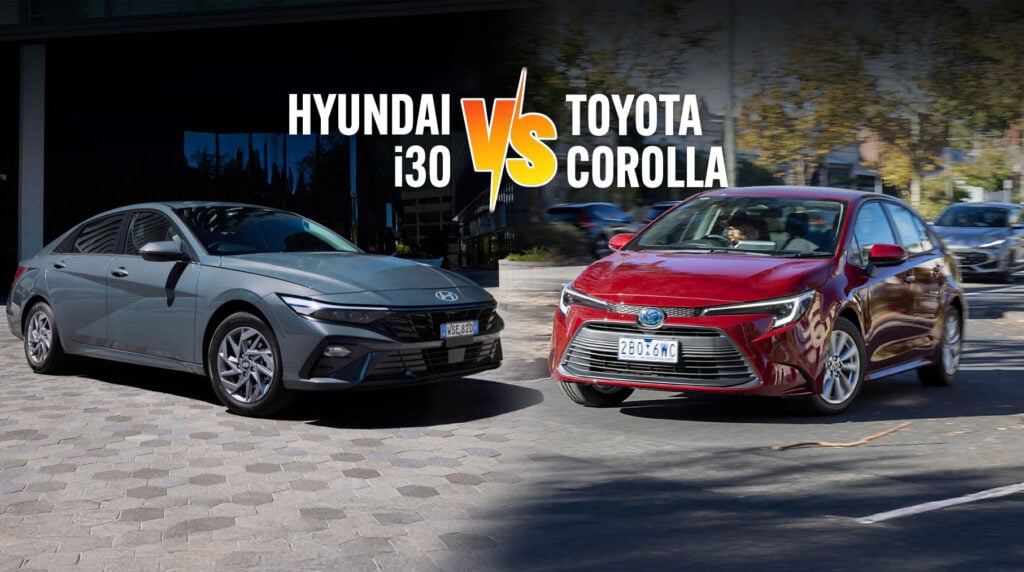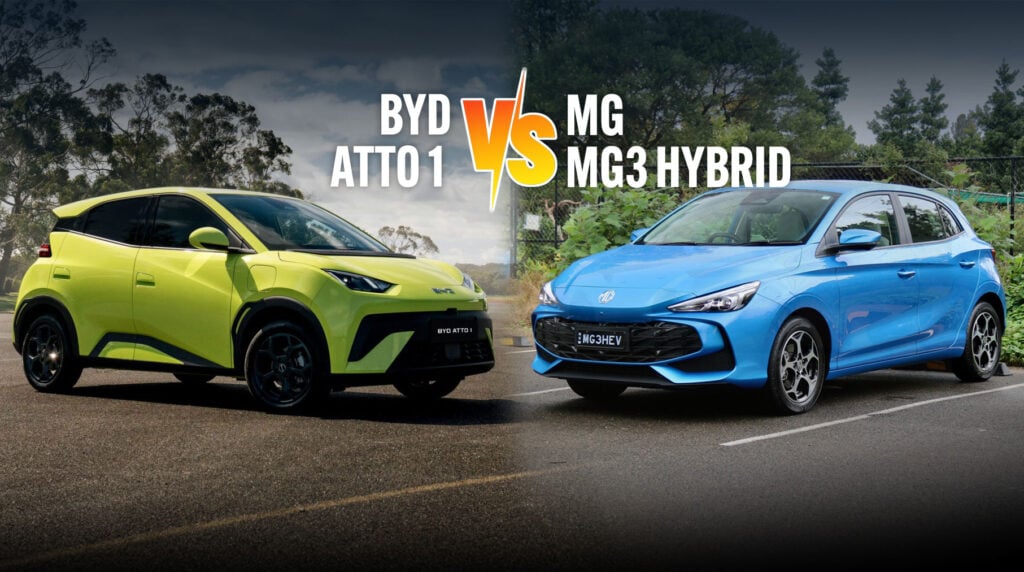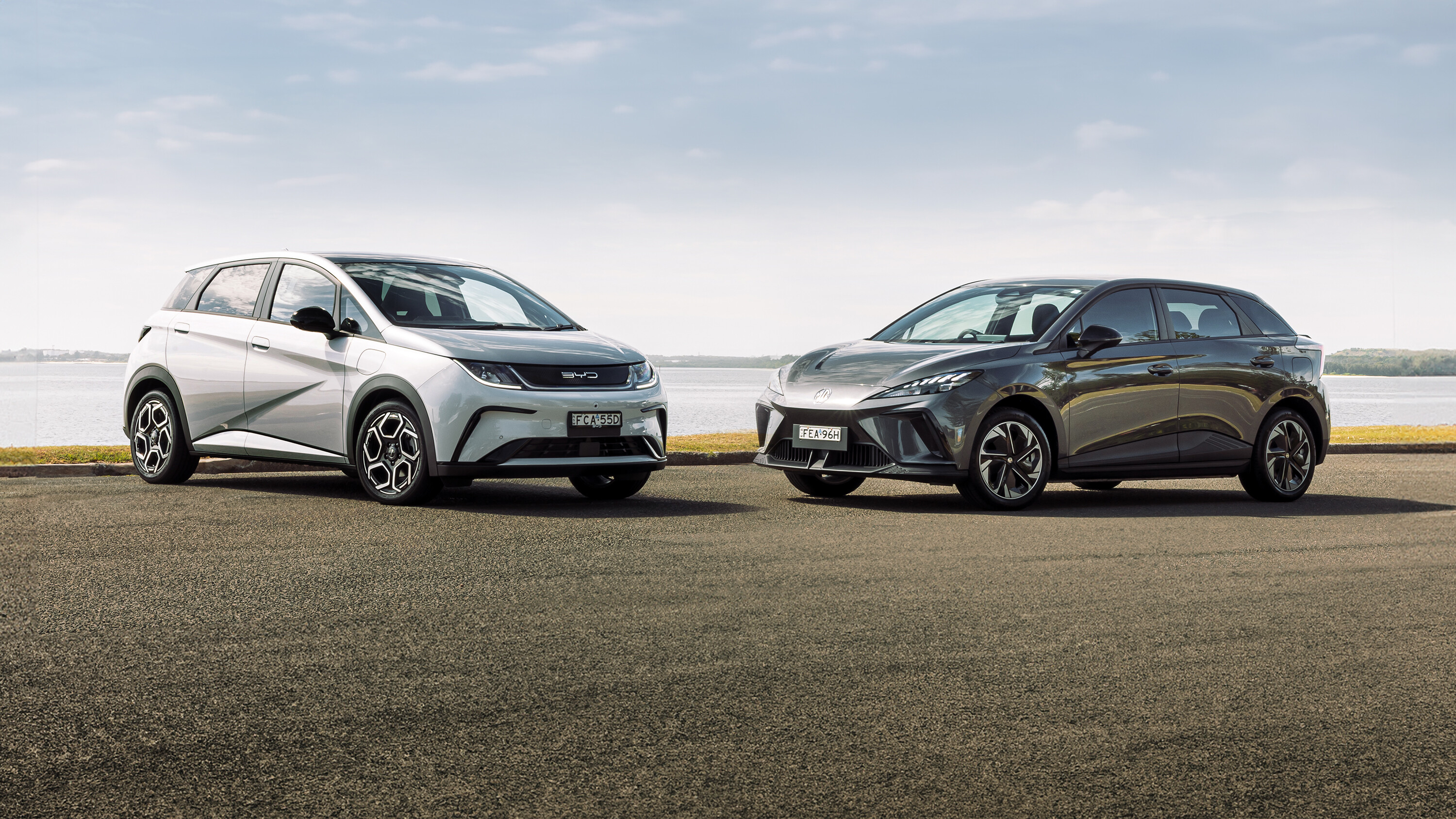
China’s auto industry has grown up fast. The industry cut its teeth teaming up with (and in some cases, straight copying) Western automakers to make cut-price ‘appliance’ cars.
In the wake of the pandemic and rising electric vehicle demand, though, there’s been a perfect storm brewing through which China is striding toward electric dominance.
Perhaps no better demonstration of this are the two affordable electric small cars you see here: MG’s excellent 4 hatch and BYD’s quirky new Dolphin.
A phoenix risen from the ashes of BL’s demise, the MG4 is undeniably a better hatch than the Brits ever produced. It’s built for us in a state-of-the-art factory in Ningde, China, and caused the motoring press to sit up and pay attention when it landed locally in August.
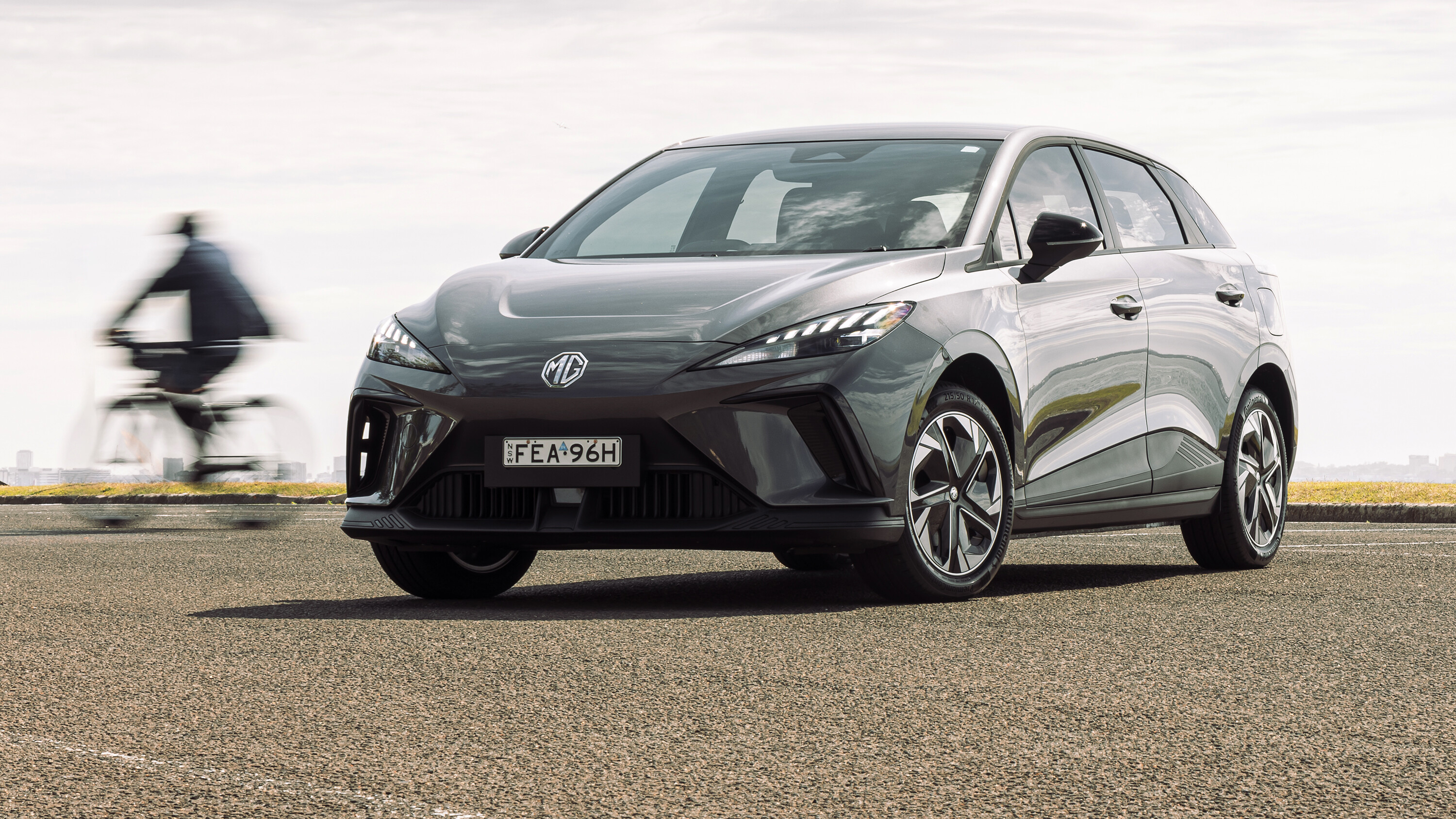
Sparking controversy in the segment is its latest challenger, the oddly-named BYD Dolphin which pettily carries ‘Australia’s cheapest EV’ title by $100 in base Dynamic guise.
The primary question we’ll be answering is which attainable EV you should put your money towards right now. But there’s a secondary angle, and that is whether the time is right to ditch your gas-guzzling hatch and dive into an EV.
After all, while these two aren’t quite as affordable as a base model Toyota Corolla, they aren’t much dearer than flagship trims to buy. Plus, if you have home solar, they’re essentially free to drive – or so the theory goes.
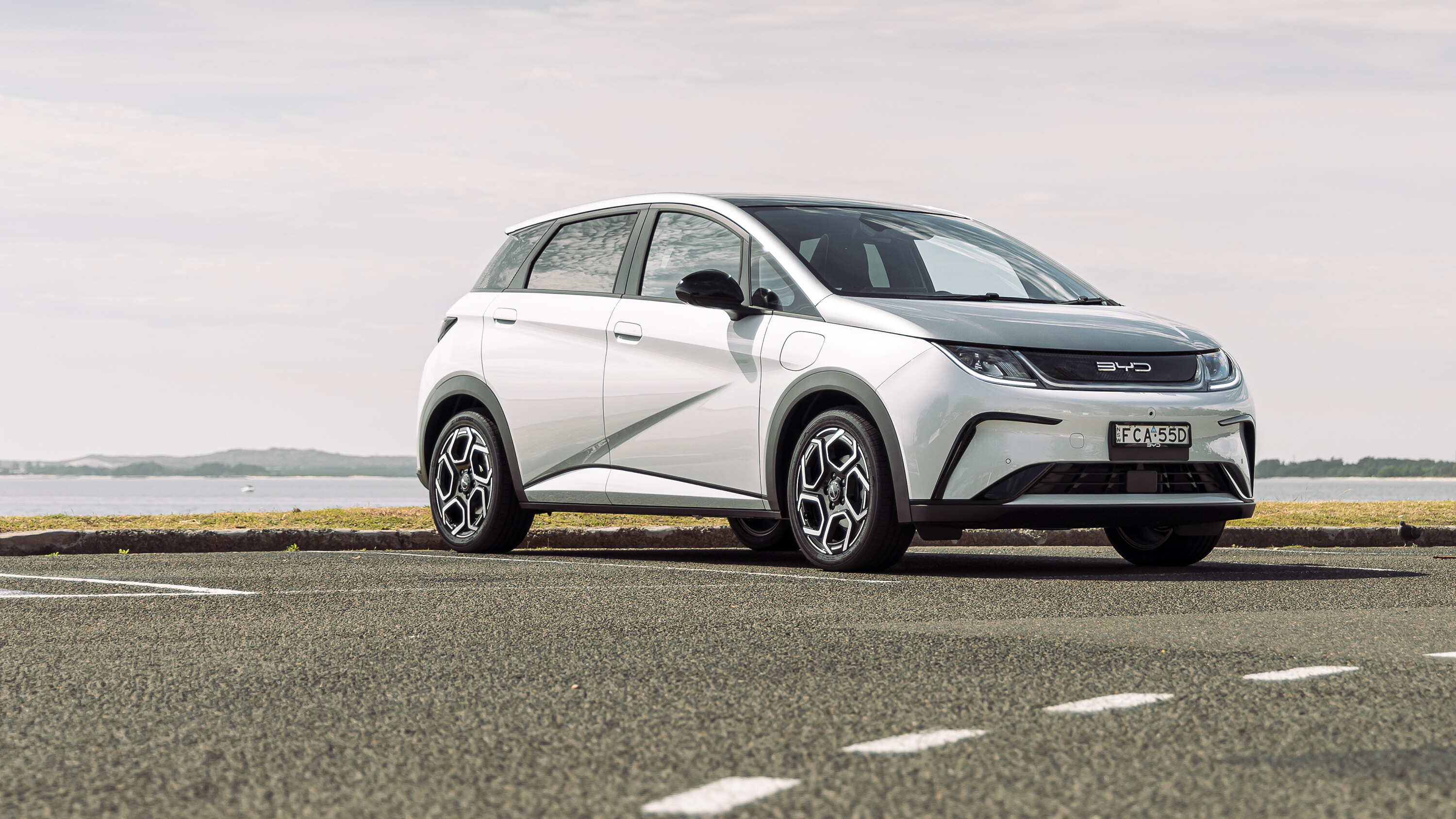
JUMP AHEAD
- What are they and how much do they cost?
- How are sales going so far?
- Interior comfort, space and storage
- How good is the technology?
- Warranty and ownership costs: crunching the numbers
- Range, charging and efficiency
- Which is better to drive?
- SCORING
- Specifications
What are they and how much do they cost?
Perhaps the equipment levels in the MG that follow in the footsteps of traditional family hatches aid its mass appeal.
The base Excite gets a good amount of equipment such as 17-inch alloy wheels, LED headlights, a 10.25-inch central touchscreen with wired smartphone mirroring, keyless entry and start, 7.0-inch digital cluster and cloth-appointed manual adjust seats.
The $44,990 (before on-road costs) Excite 64kWh tested here commands a $6000 premium over the base 51kWh car and that’s all battery and motor you’re paying for.
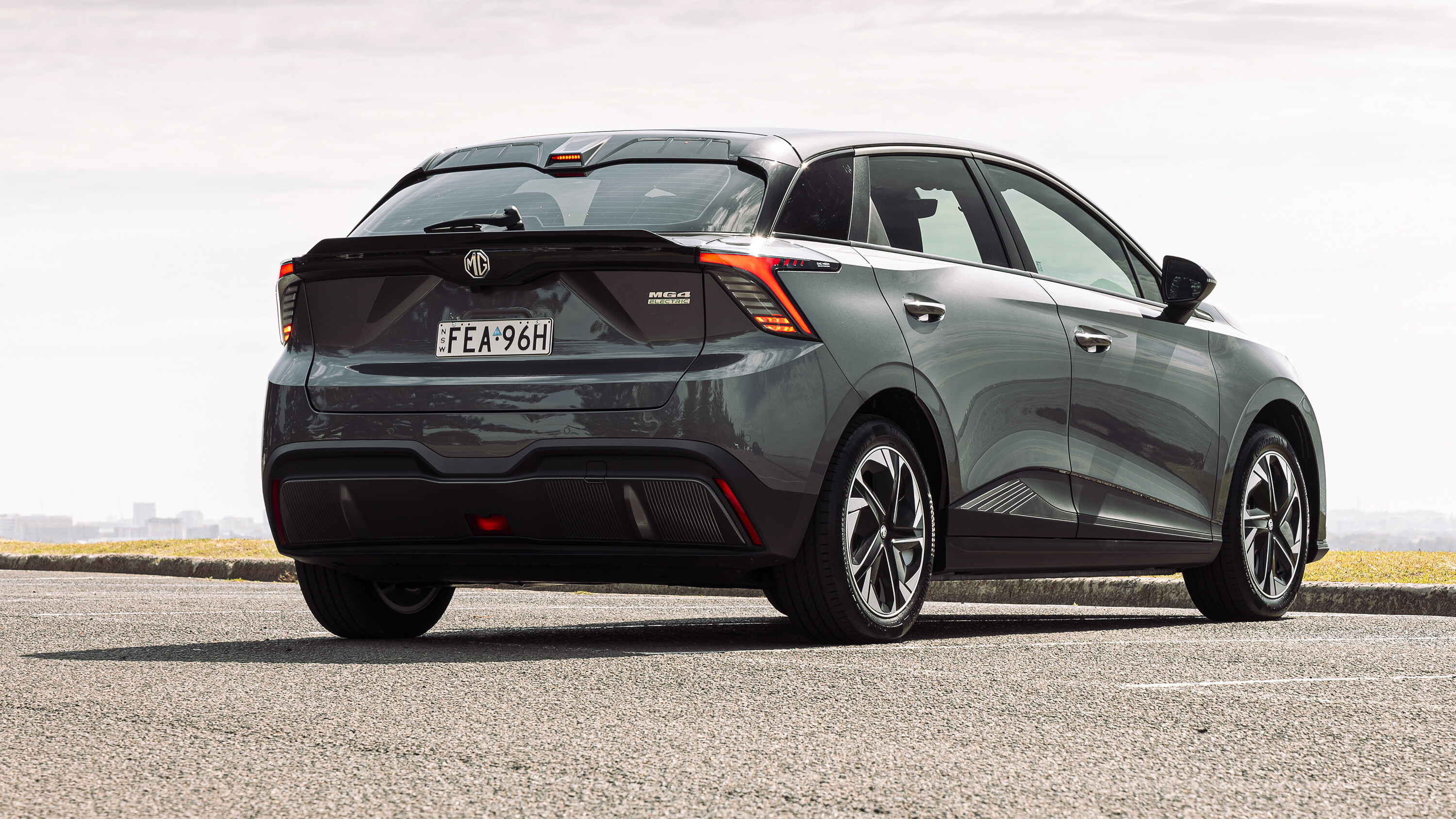
With a 62.1kWh usable NCM lithium-ion battery, its WLTP-rated driving range is 450km. Spend an extra $3000 on the Essence and you’ll score nicer cabin materials, powered seats, a 360-camera and 18-inch alloys – it’s a no-brainer for private buyers in our book.
BYD’s effort is a little unconventional, essentially offering one equipment-packed variant in two battery sizes – the $38,890 Dynamic price leader and the $44,890 premium tested here.
The Dynamic’s spec sheet is enough to embarrass the MG4: heated seats, a heat pump, 12.8-inch power rotating touchscreen, four auto up/down windows (a surprising omission from the MG) ‘vegan leather’ upholstery, adaptive LED headlights, crisp 360-degree camera, and wireless smartphone charging.
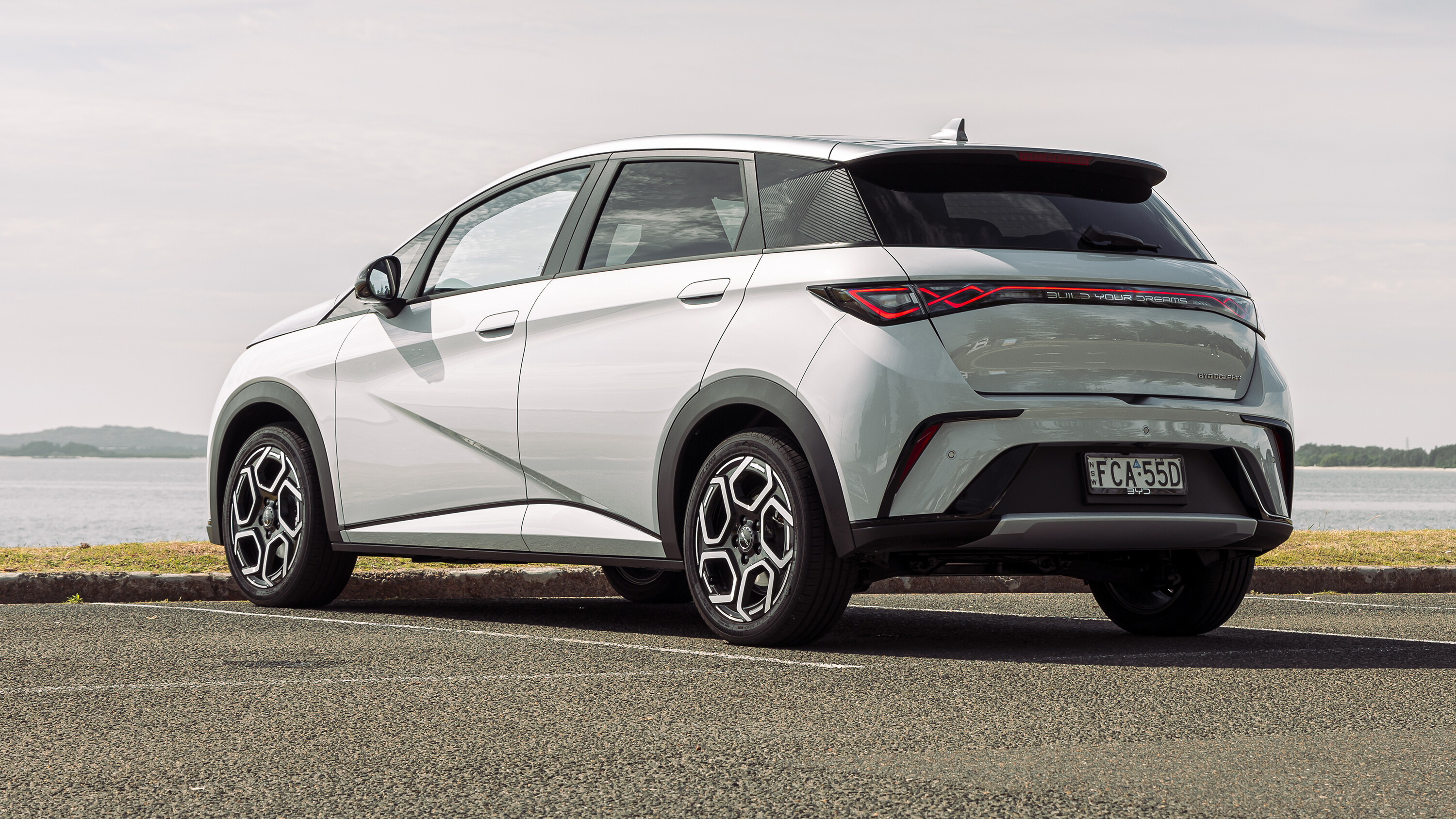
The premium brings a bigger 60.4kWh in-house made ‘Blade’ LFP battery pack for 427km of combined WLTP driving range. It also adds 17-inch alloy wheels and a two-tone paint scheme in either Surf Blue, Coral Pink, Atlantis Grey or the tested Ski White.
In our book, the limited edition blue-wheeled Dolphin sport is a rather pointless $5000 indulgence – the Premium’s where it’s at.
How are sales going so far?
Silly name aside, BYD’s Australian importer is bullish about the Dolphin’s local success. And, to be fair, CEO Luke Todd has stats to back this up.
Sure, the Atto 3’s may not have been ‘the most successful local car launch ever’ as he claims, but sales figures don’t lie. Electric cars only make up about 7.0 per cent of our market, but so far this year there have been more Atto 3s delivered than Toyota Camrys and Mazda 3s. BYD will look for the Dolphin to build on the Atto 3’s success.
For comparison’s sake, since its August introduction MG has been able to shift a similar number of 4s each month as BYD has with the larger Atto 3.
As market demand for electric cars continues to fluctuate it’s hard to predict how the Dolphin will settle into its sales life, though the similarly quirky GWM Ora has struggled to match the heavy hitters such as Tesla and MG.
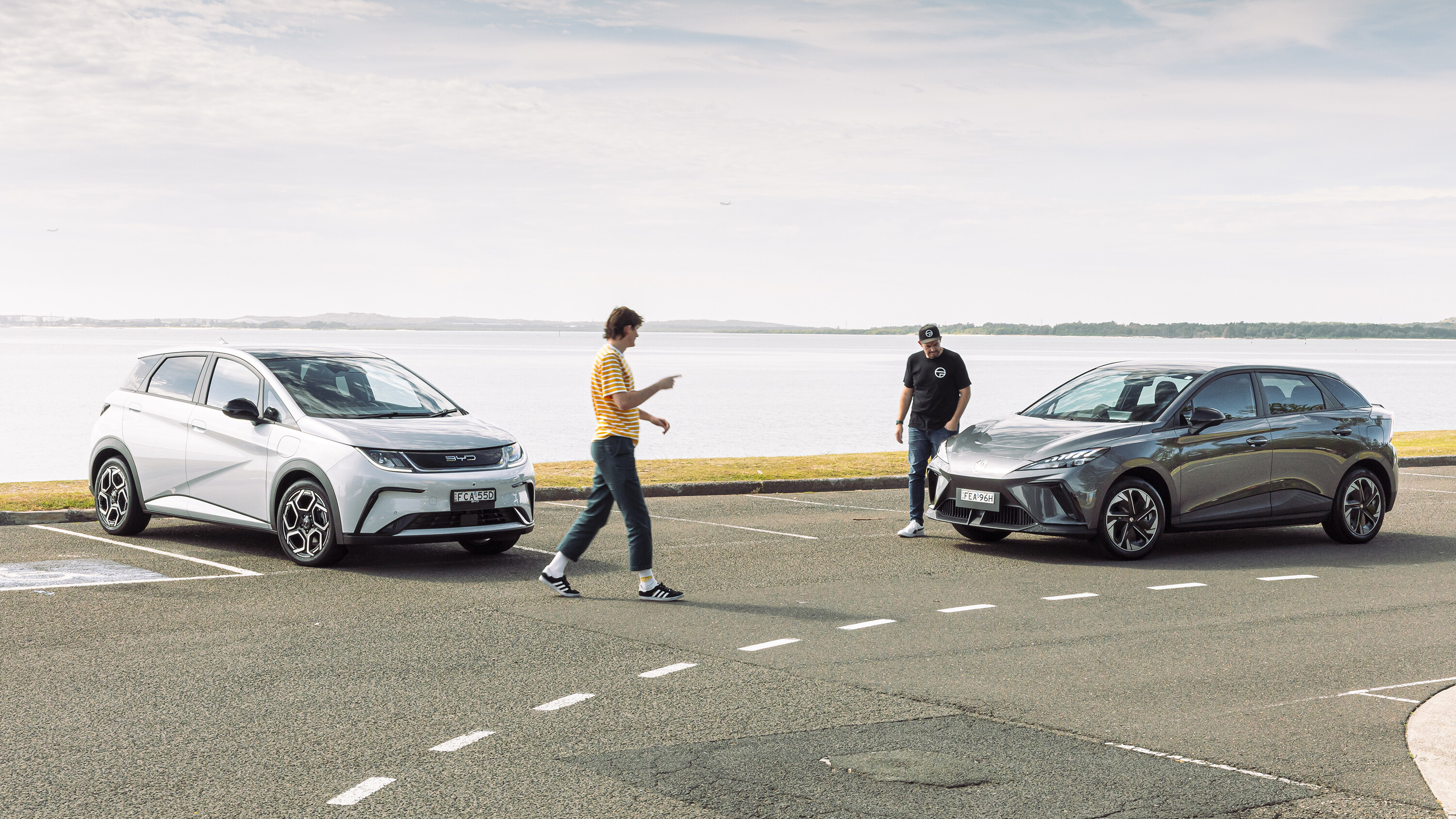
Interior comfort, space and storage
If the spec sheets are different, then the cabin executions are antithetical. The MG is recognisable with a Volkswagen-inspired design and mostly comprehensible layout, aside from the mirror adjustment hidden behind the steering wheel.
There’s another miss in the MG’s Tesla-like start procedure (that requires no key turning or button prodding).
If you twist the rotary dial before the car’s good and ready it puts the ‘transmission’ in neutral and disables the parking brake. Meaning that if you’re on a hill the MG4 will roll unnervingly before hurriedly re-engaging the handbrake. That never happens in a Tesla or Polestar.
Incidental storage is excellent, however, with the floating centre console doubling as a rubberised phone pad (and a wireless charger in Essence trim), a covered cubby with two small cup holders, a deep central storage bin under a comfy armrest, and door bins that take a one-litre camping bottle.
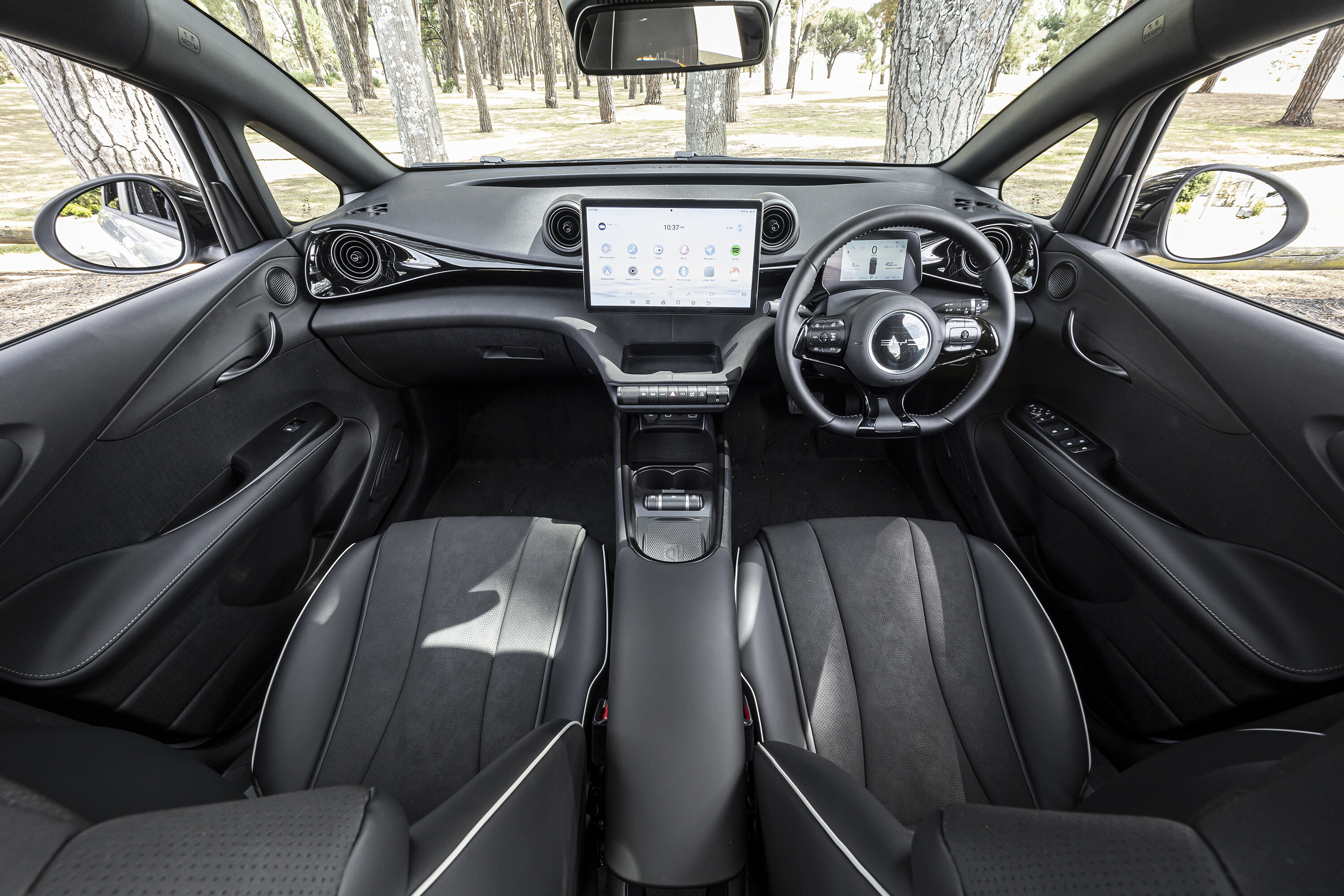
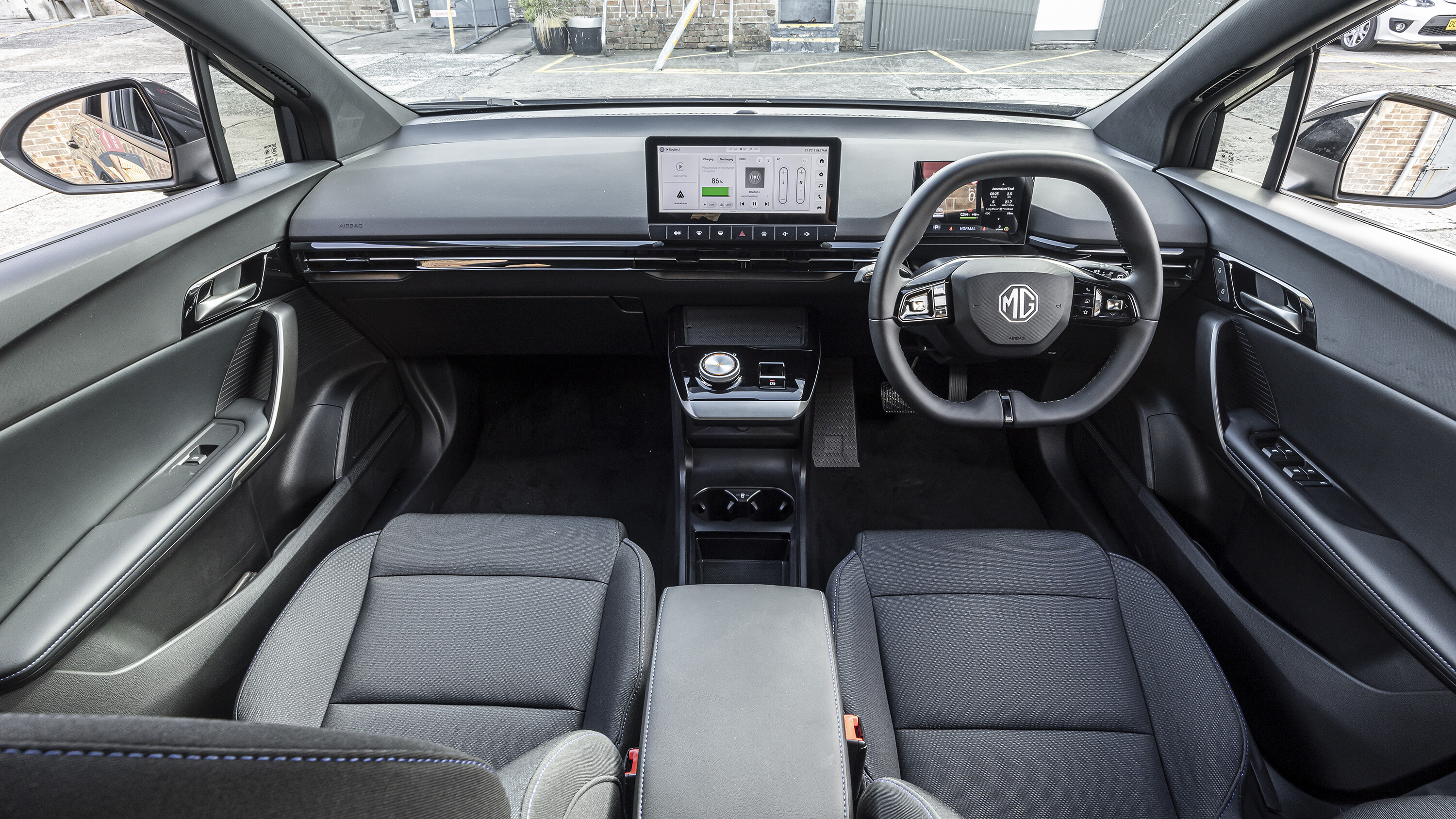
Material quality is decent and consistent but not on par with Volkswagen or Skoda. Though ‘only’ manually adjustable, the cloth-appointed pews are comfortable and supportive over hours in the saddle.
The BYD has some quirks. You’ll be searching for the start button (laid horizontally into the dash and hidden behind the Fiat 500-esque steering wheel) and then potentially fumbling with yet another new take on the gear selector that’s built into the row of cylindrical switches. It works, but not intuitively.
Those power seats offer more granular adjustment but the ‘vegan leather’ is what we used to call vinyl, meaning the Dolphin’s black upholstery gets plenty hot and sweaty beneath the fixed glass roof. Like the MG, it has great storage solutions such as a secure wireless charger and nifty multi-tool that can be used to cut seatbelts or break glass in emergencies.
Note: In all grouped photos, BYD Dolphin is pictured top, MG 4 bottom.
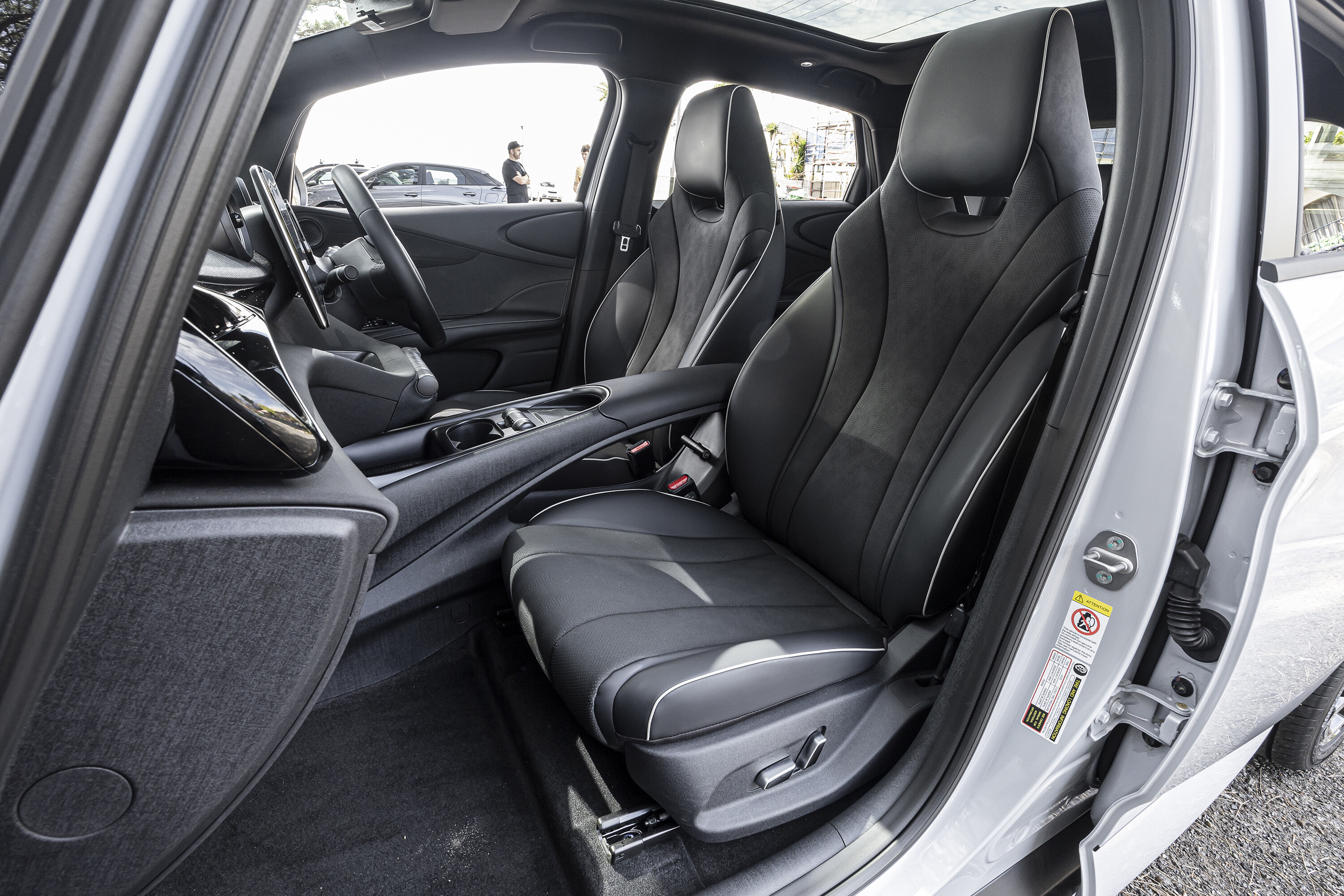
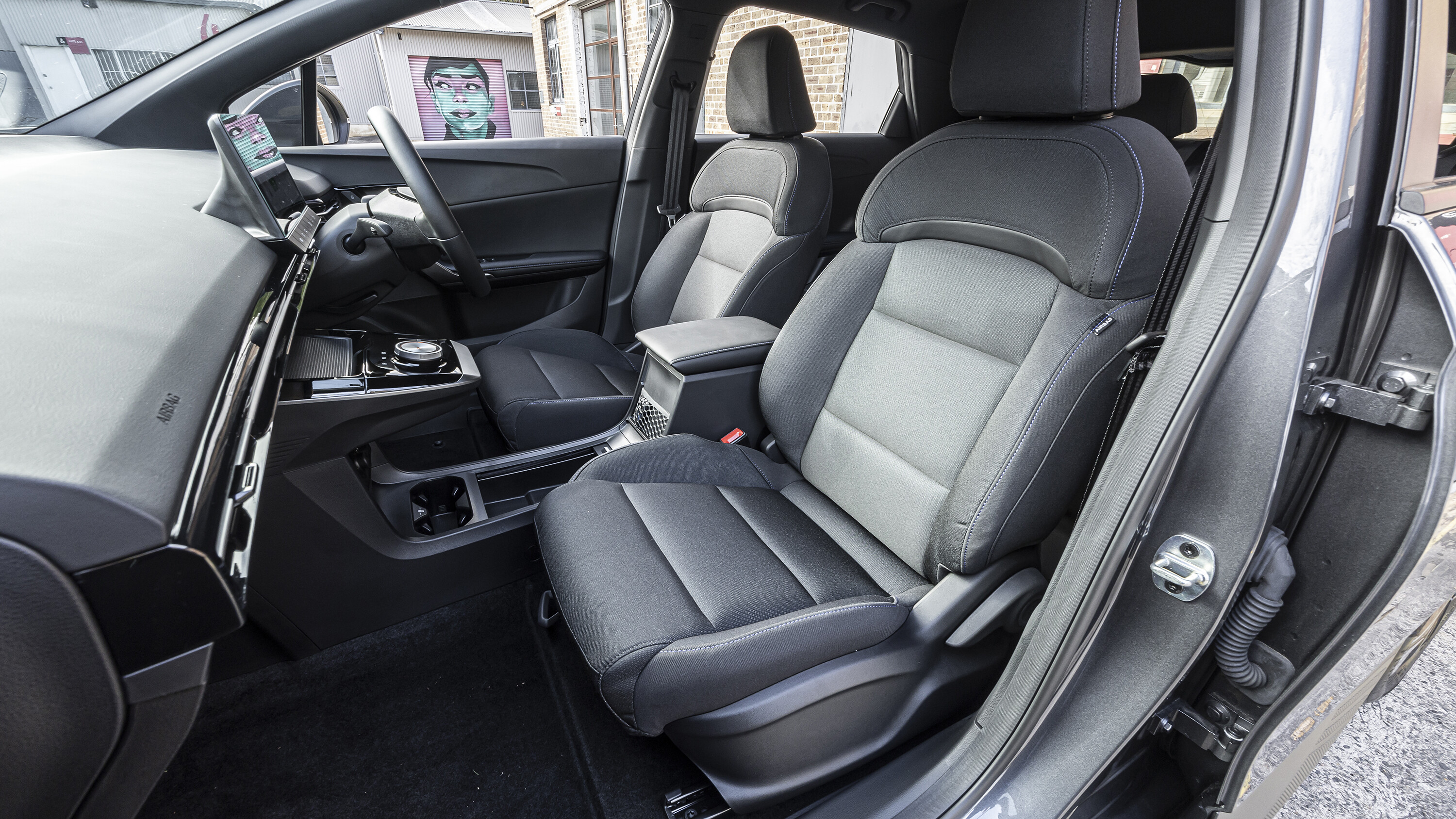
Just like your average family hatch the MG4 has space for four with generous rear quarters that accommodate those over six feet. The view out the front and side windows is good, and there’s width enough to squeeze three.
The longer Dolphin offers more leg and toe space but the fixed glass roof kills headroom. Being narrower, too, it’s harder to squeeze three adults across the bench.
Amenity is better in the Dolphin with two USB charge points and a fold-down armrest – the MG does with just one USB. Neither car has adjustable air vents in the back.
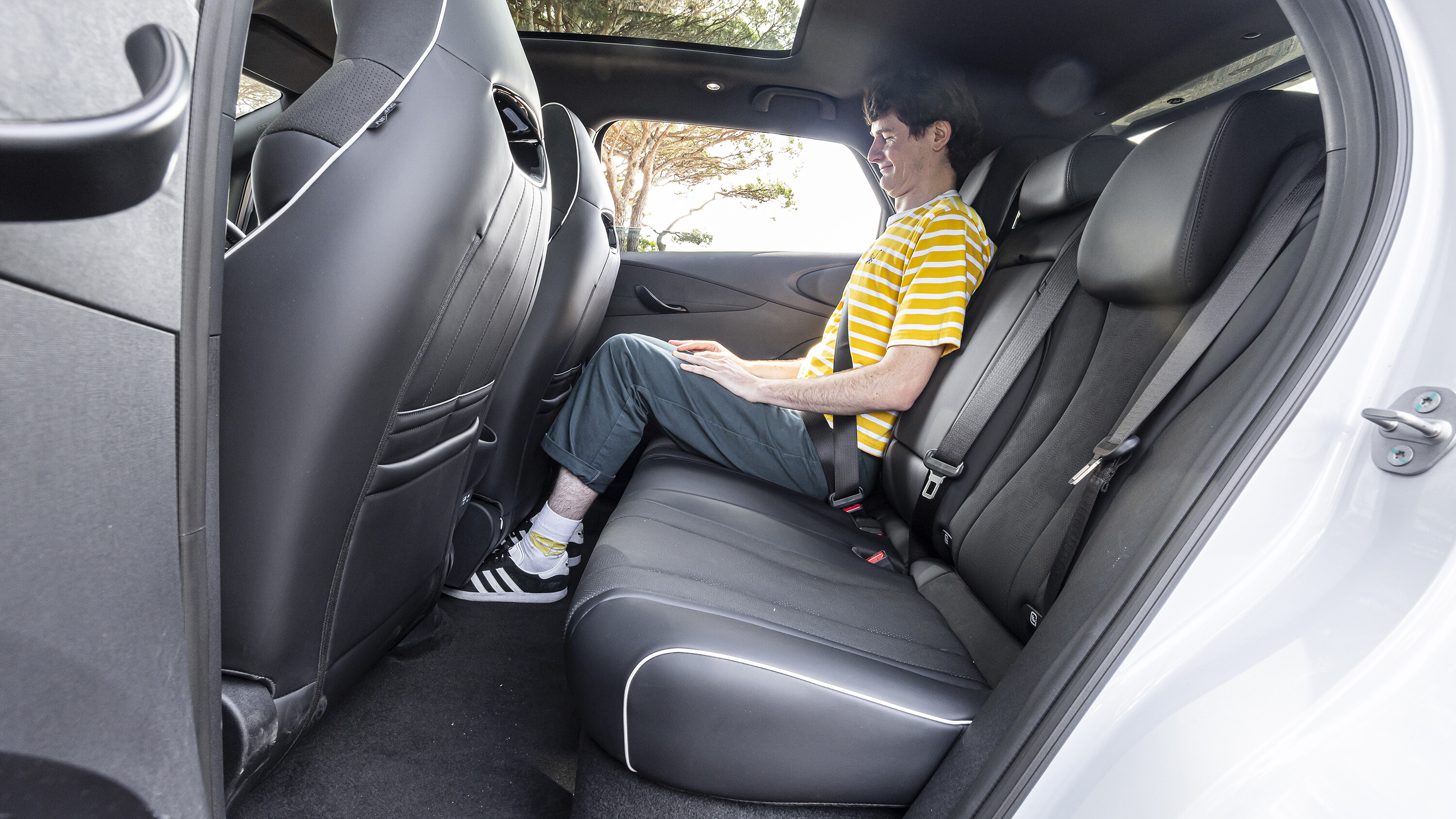
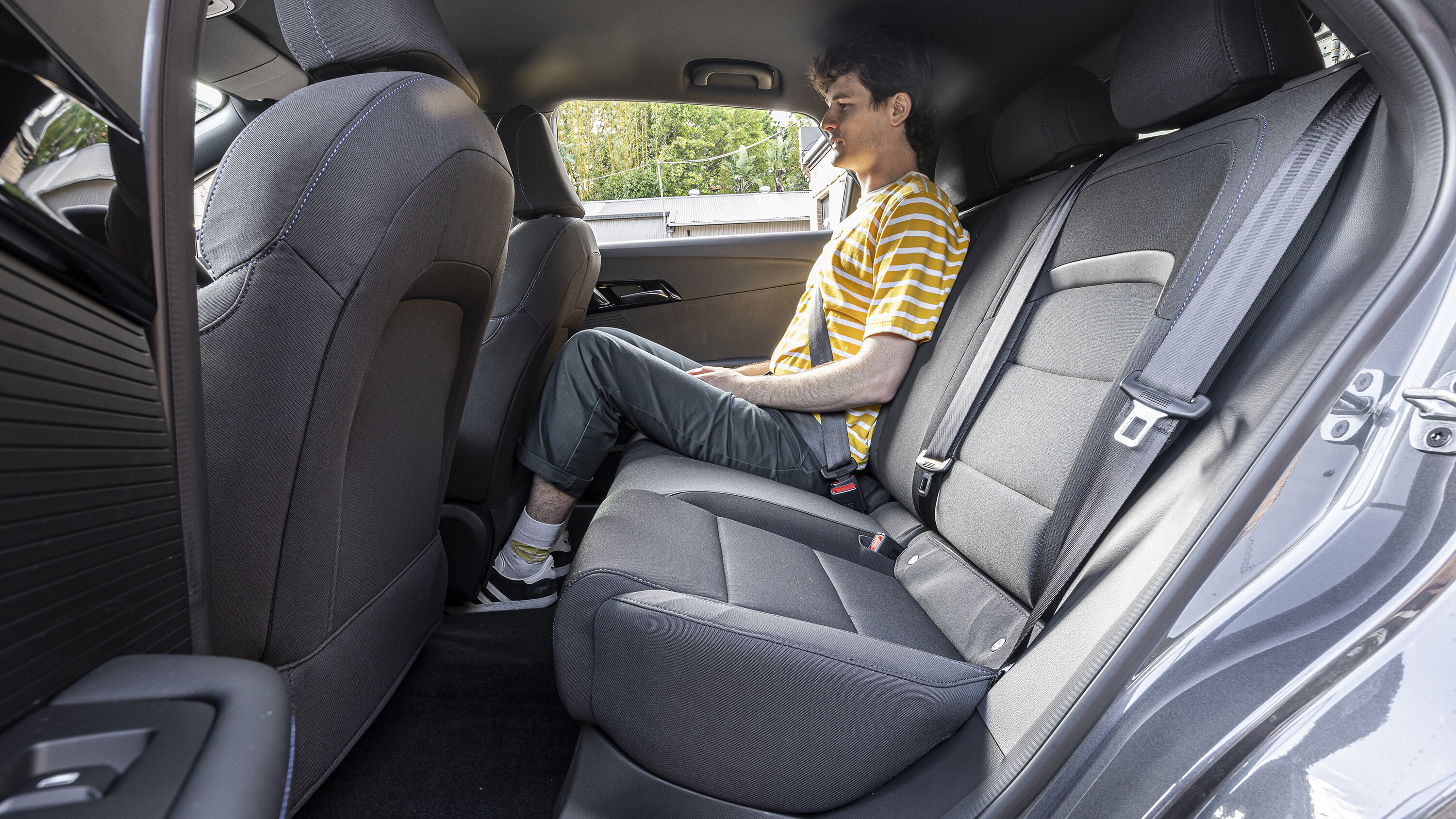
Neither car has a big boot though the MG4’s on-paper figure of 350L is higher. It has one shopping bag hook, a light, a single-height base and there’s a step when the 60:40 backrest is folded.
The BYD has a 345L space with a dual-level floor that makes for a fully flat load bay when the seats are folded and gives some hidden storage.
Thanks to a wider aperture, it’s easier to load bulky items into the MG’s rear end than the Dolphin’s. Frustratingly, neither car comes equipped with even a space-saver spare tyre. We don’t find this so bad in the city-focused Dolphin but the MG4 is fun enough to drive that a space-saver spare would provide extra peace of mind should you find yourself in the country.
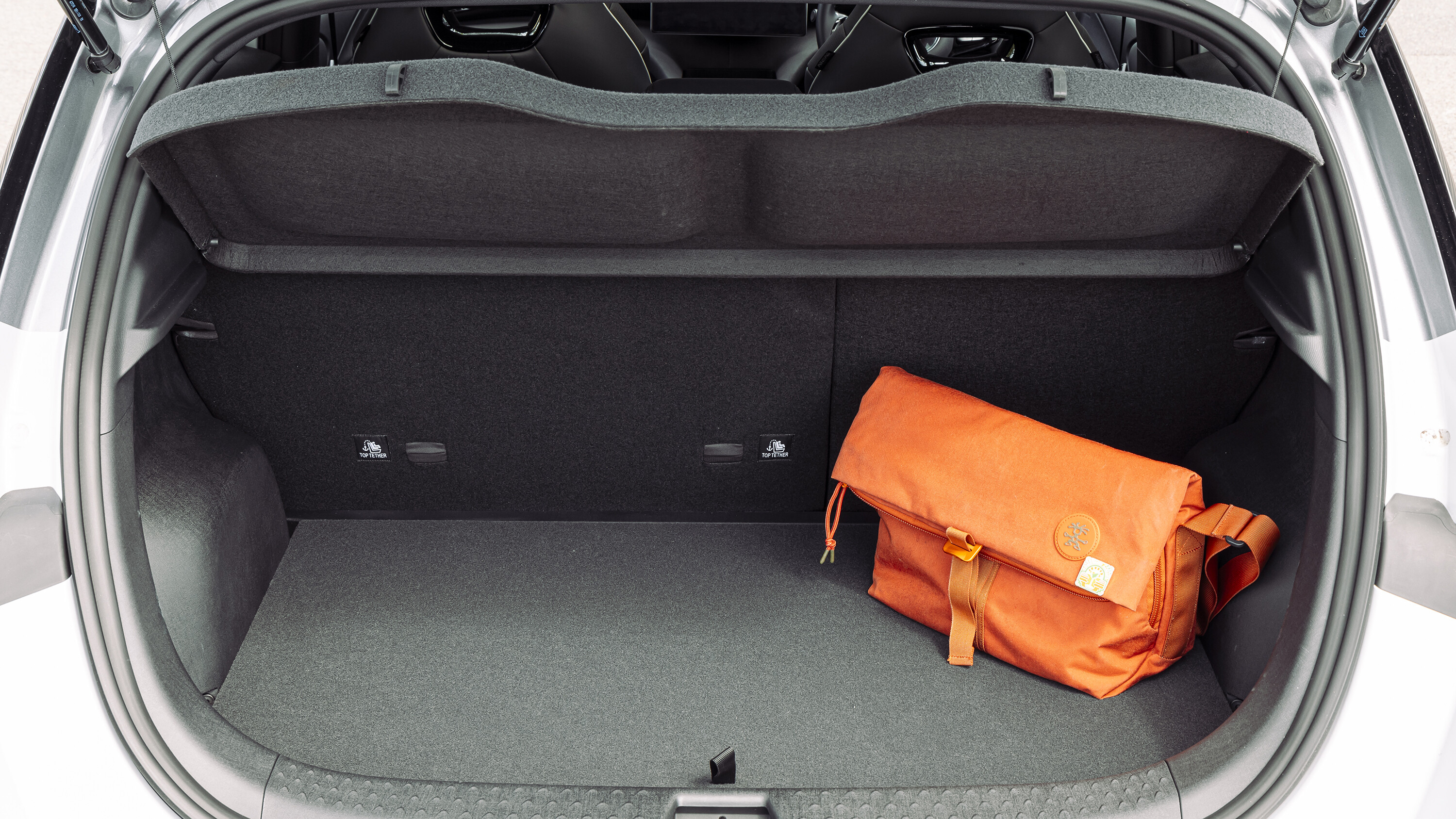
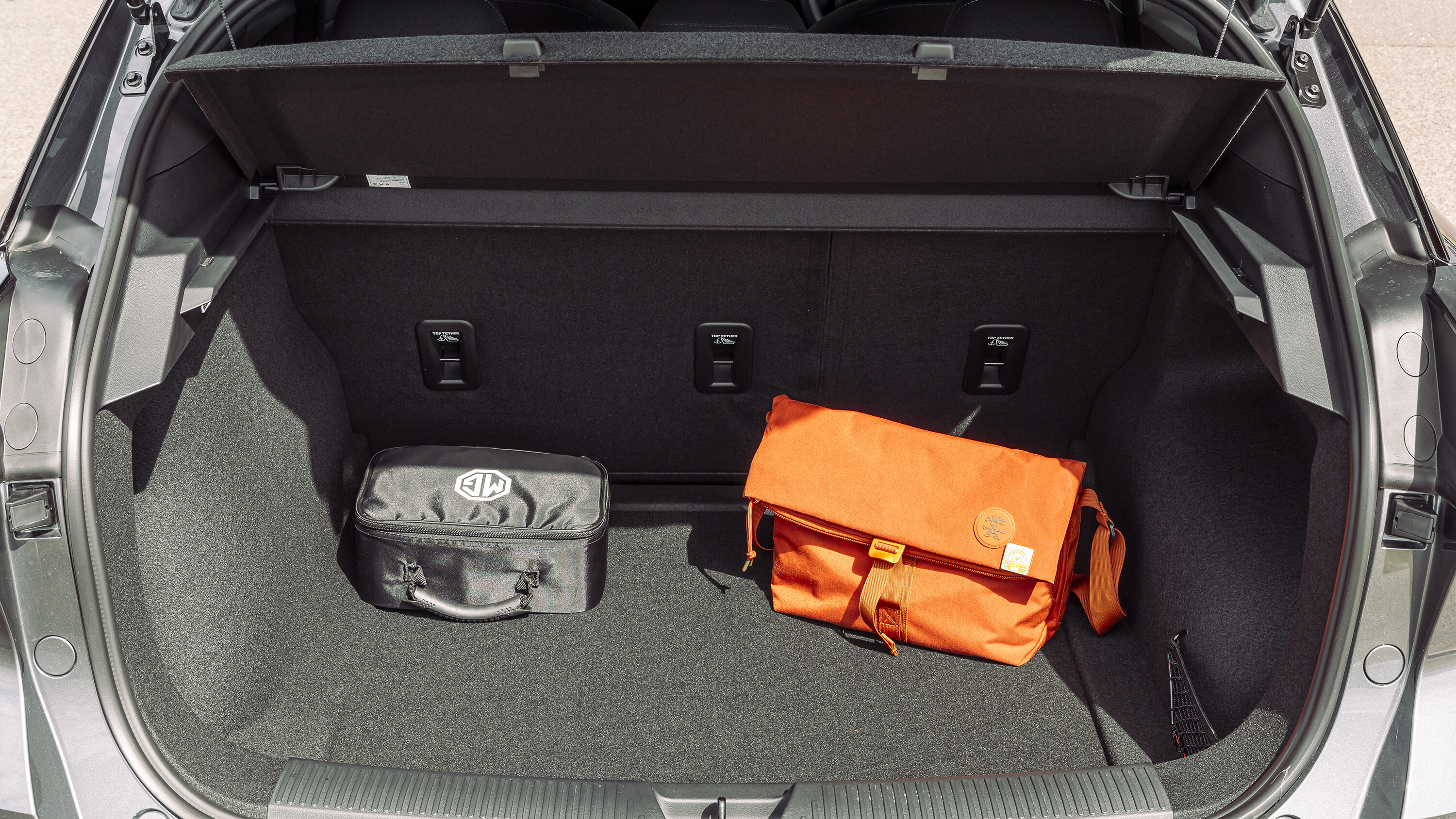
How good is the technology?
While the Dolphin’s dramatic layout is packed with quirky gimmicks (and plasticky materials), the core functionality is reassuringly effective.
The connected infotainment system, for example, is easy to use and allows you to download apps such as Spotify to avoid mirroring your phone using a cable (like the MG4, there’s a USB-A, USB-C and 12-volt port accessible from the front seat).
Those extra two speakers in the BYD’s sound system make for a cleaner and more powerful listening experience than the MG’s decidedly muffled four-speaker system, too.
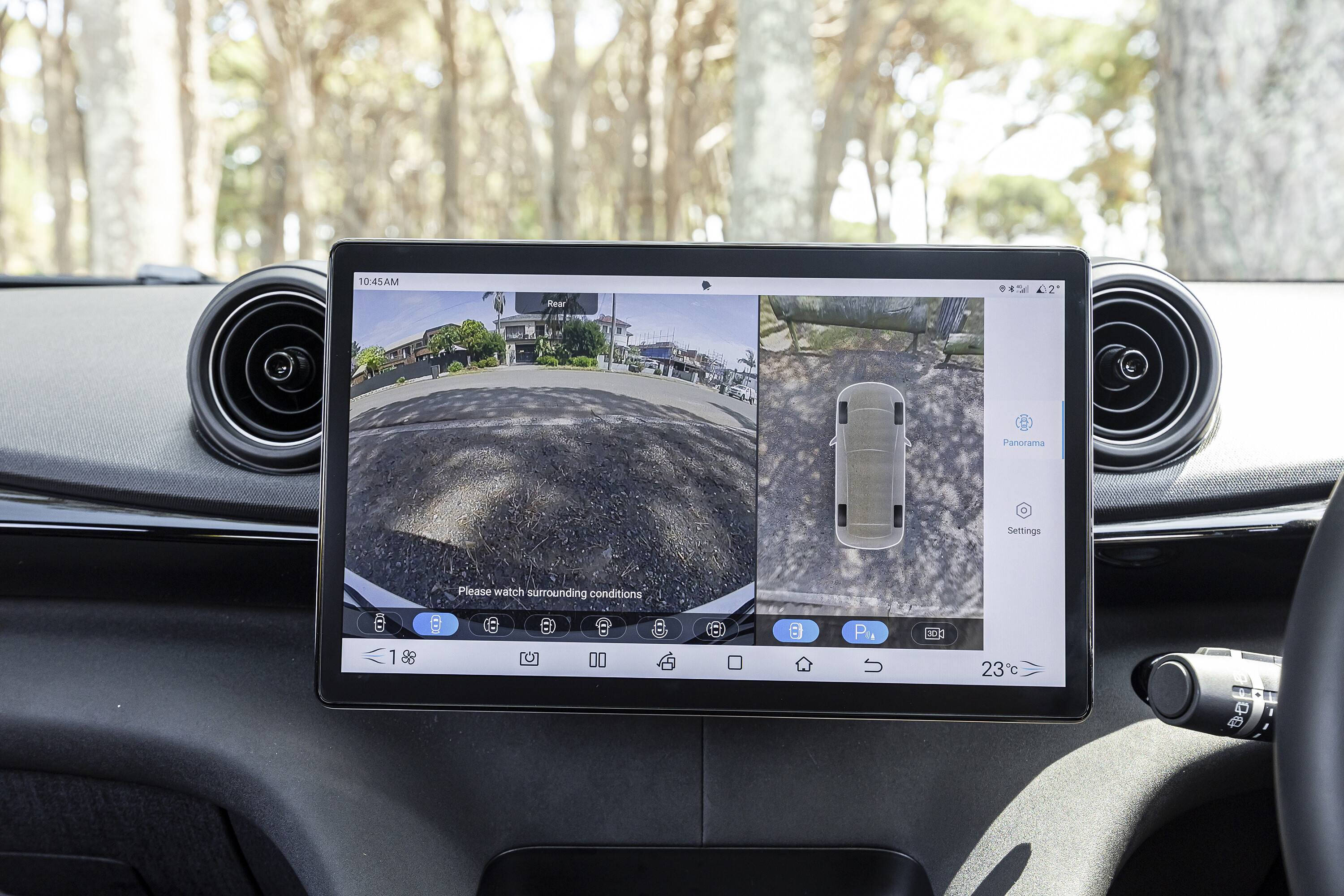
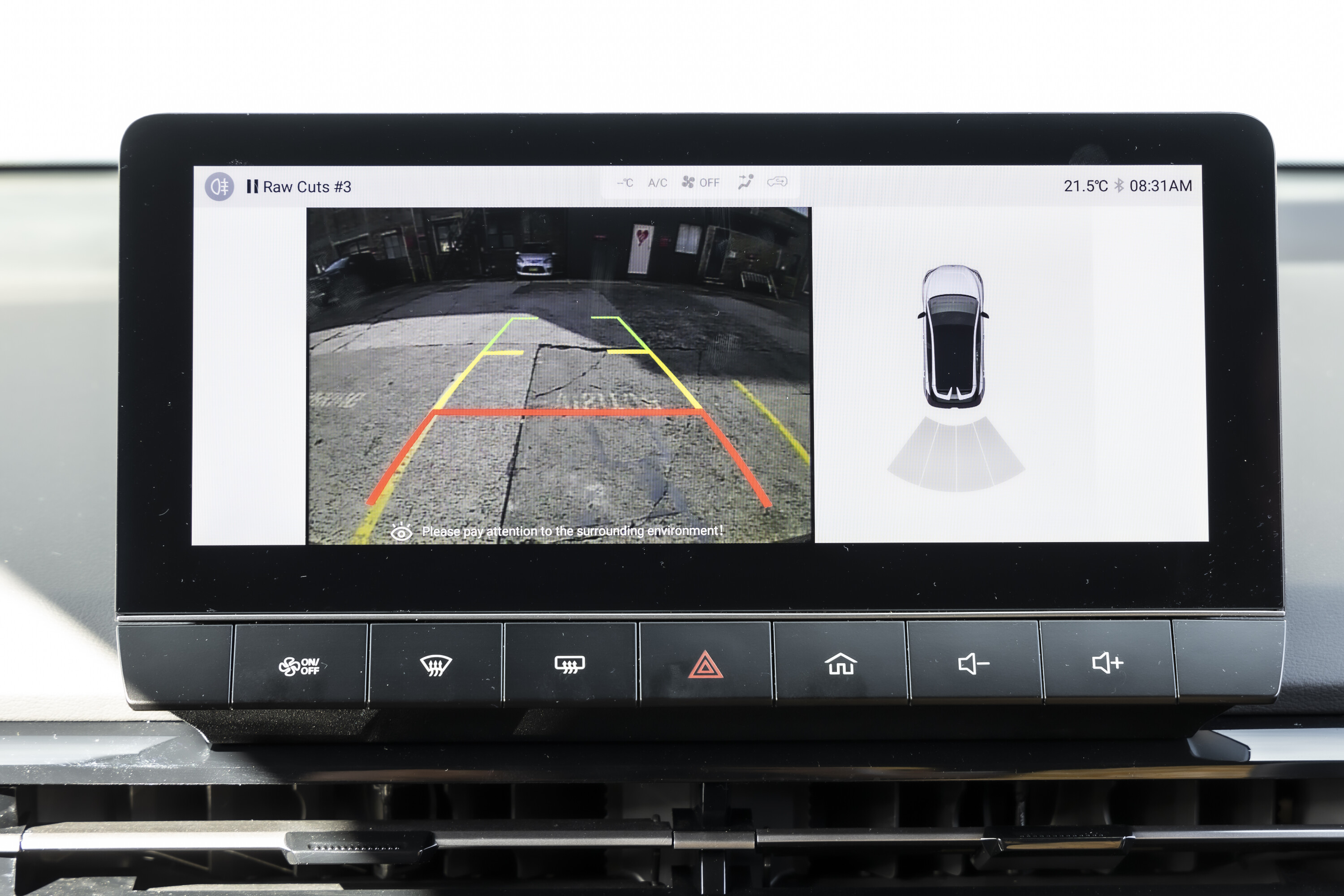
One of the MG4’s home screen panels allows adjustment of temp and fan speed quite simply, but the Dolphin is better in this area.
And, while both cars house the climate control within menus only the Dolphin ships standard with ‘Hey BYD’ voice recognition that’s remarkably intuitive and effective (though we hate to think about data privacy issues) backed up by persistent controls for fan and temp on the main menu.
One of the MG4’s home screen panels allows adjustment of temp and fan speed quite simply, but the Dolphin is better in this area.
The MG’s climate control is also unlike any other when it comes to temperature. I’m usually a 21º guy – perhaps 22º in an icy-cold Toyota – but the MG4? I found myself at 25º with anything lower simply too chilly. And yet, pushing it up to 26º turned the cabin into a sauna.
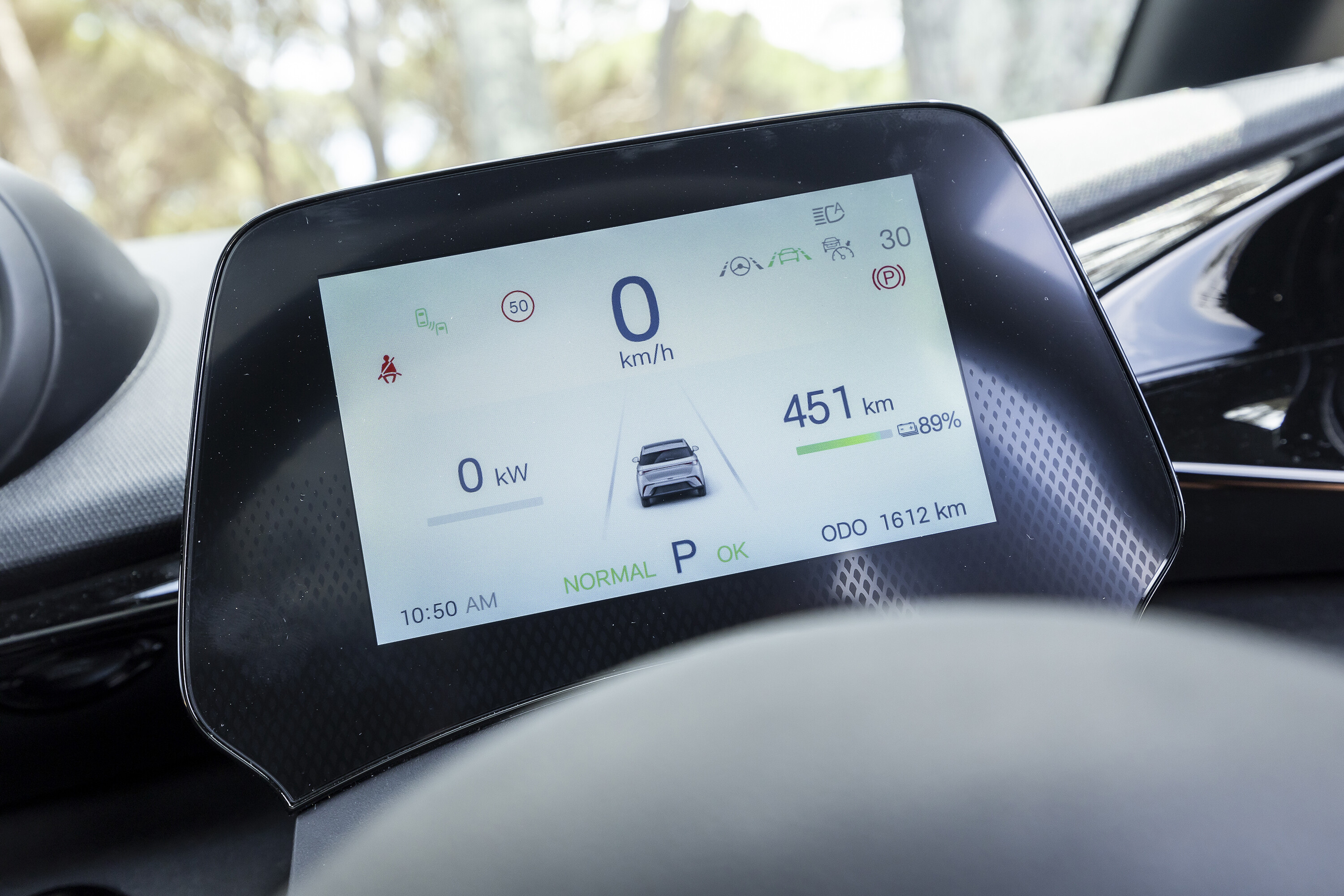
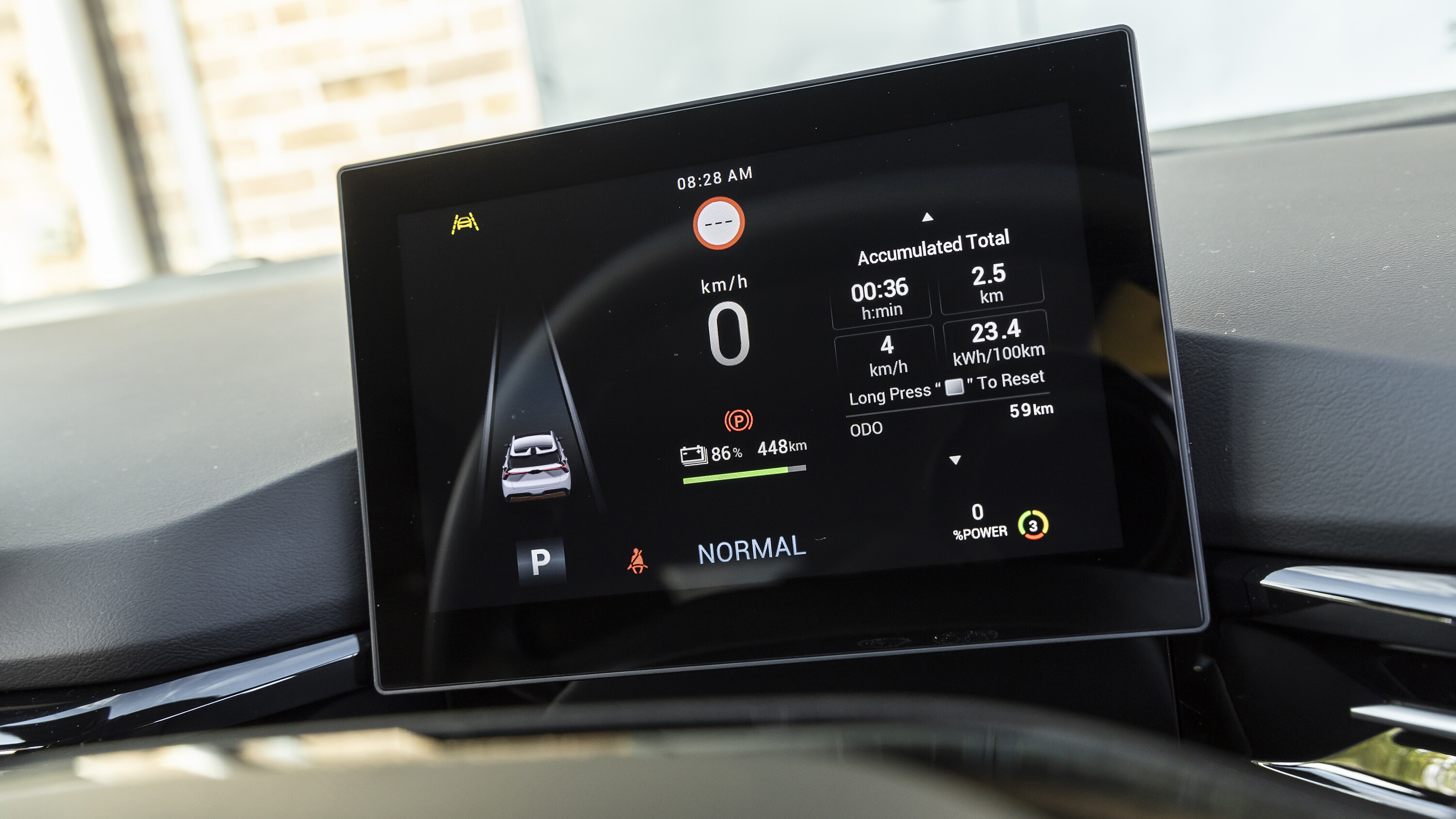
Warranty and ownership costs: crunching the numbers
These two are still dearer than equivalent combustion cars to buy, but do they make it up in the long run? We’ve ignored the minefield of state-by-state incentives in this story, but these can further influence affordability.
The BYD has everything needed to wow in a dealership scenario and it’s backed up by a six-year/160,000km warranty (with eight years/150,000km for the battery and motor).
Servicing is due every 12 months/20,000km and can be carried out at an increasing number of BYD locations (or MyCar centres) at a fixed price of $1384 for five years.
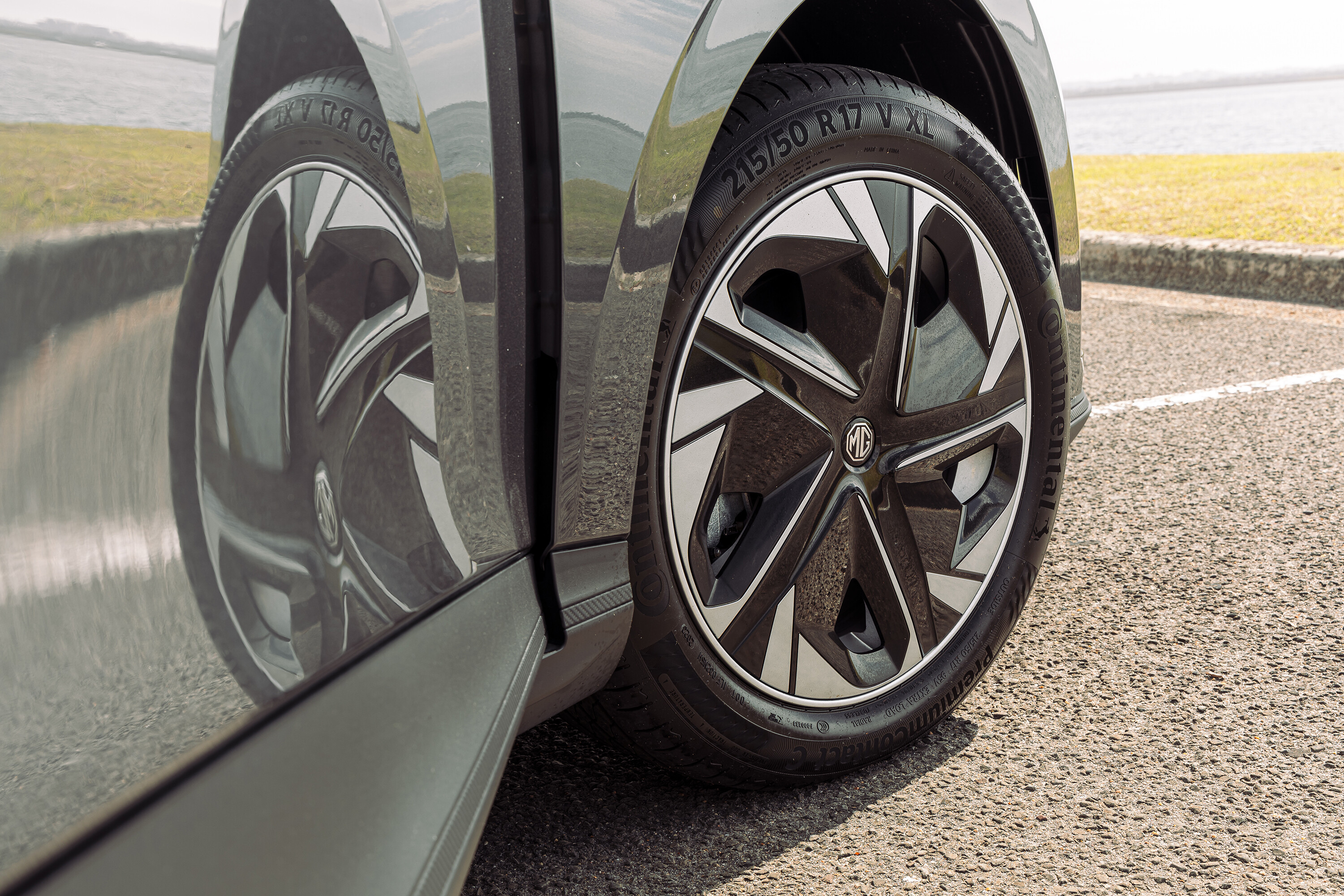
MG beats BYD on ownership with a seven-year unlimited-kilometre warranty and equal length capped-price servicing program.
The MG4’s service intervals are longer, too, requiring a trip to a mechanic every 24 months or 40,000km for $1478 over six years.
Compared to a Golf 100TSI R-Line, a home-charged MG4 will save you $3258 over three years in running costs (including fuel/power, insurance, and servicing) easily offsetting the $2000 price premium. Using public electricity ($0.60/kWh against about $0.34/kWh) narrows the gap to $1965.39 over three years.
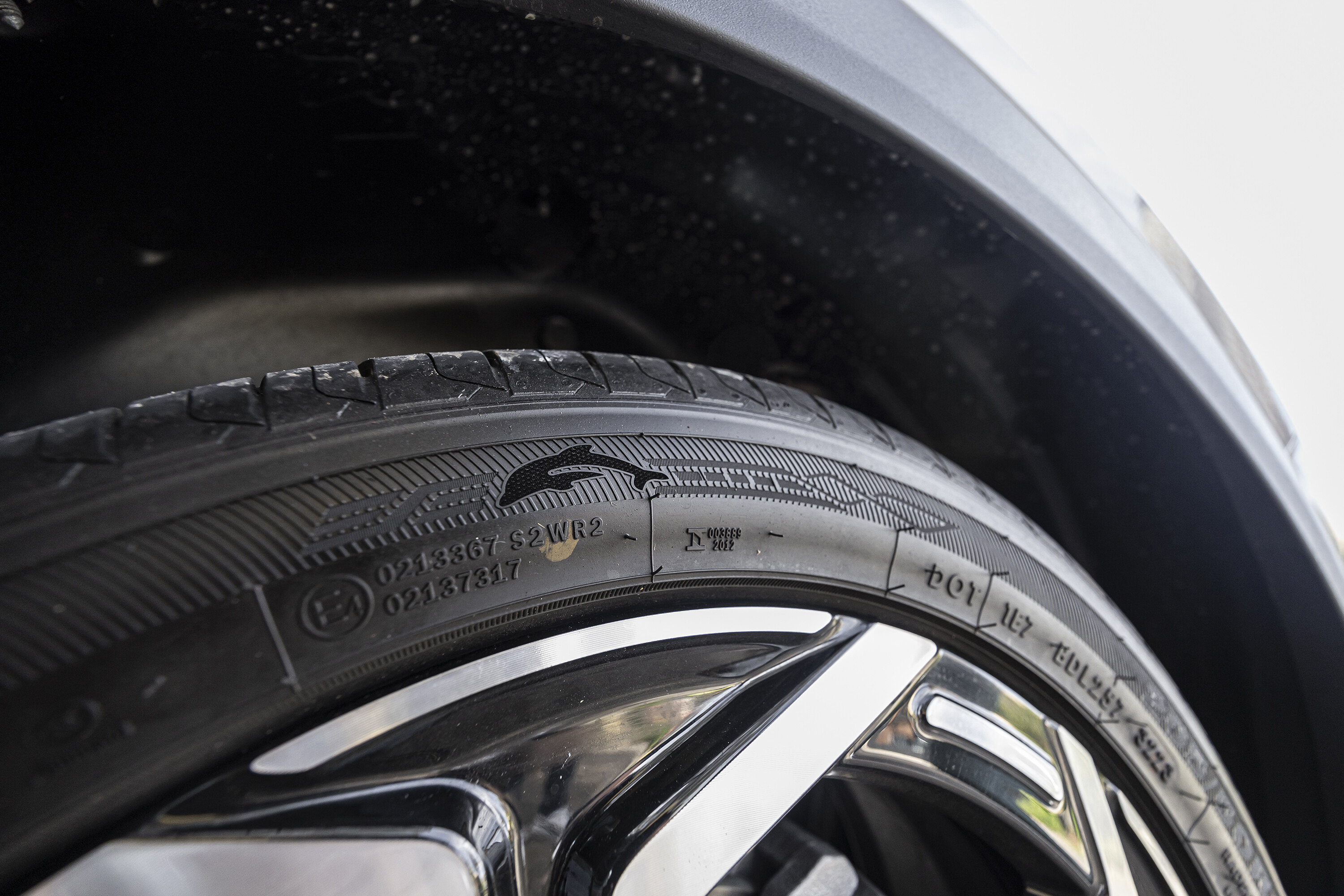
Yet put the dearer-to-run Dolphin and Toyota’s fuel-sipping Corolla hybrid into the picture and it’s less rosy for the EVs; the Corolla is about even with the EVs if you’re using powering it exclusively at public chargers.
Then there’s depreciation. As new brands in the Australian market with volume aspirations and affordable purchase prices, the BYD and MG have extremely weak three-year residuals according to Redbook (both list at 48.5 per cent).
That means the close contest with the Corolla opens up to a $7500 gap to the publicly-charged EVs (about $6200 for home charging) when it comes time to get rid.
| Vehicle | Total 3yr ownership cost | Purchase price (before on-road costs) | Redbook 3yr resale | Depreciation cost after 3yrs | 3yr servicing costs | Combined energy consumption | Power or fuel bill 3yr | Insurance premium 3yr |
|---|---|---|---|---|---|---|---|---|
| BYD Dolphin Premium (home/public charged) | $30,443 / $31,773 | $44,890 | 47.80% | $23,433 | $748 | 14.1kWh/100km | $1740 / $3071 | $4522 |
| MG 4 64kWh Excite (home/public charged) | $30,165 / $31,458 | $44,990 | 47.80% | $23,485 | $296 | 13.7kWh/100km | $1691 / $2984 | $4694 |
| Toyota Corolla ZR Hybrid | $23,876 | $39,100 | 59.00% | $16,031 | $615 | 4.0L/100km | $3,049 | $4181 |
| Volkswagen Golf 110TSI Life | $28,425 | $42,990 | 57.00% | $18,486 | $1,550 | 5.8L/100km | $4421 | $3968 |
Insurance
Insurance premium sourced from AAMI for a 30-year-old male living in Inner Sydney; petrol calculated at $2.10/litre; costs calculated based the ABS average of 12,100km/year.
Range, charging and efficiency
Despite better lab figures, in the real world, the MG is less efficient. What this comes down to is hard to know – it could be aerodynamics or rolling resistance, but it’s probably BYD’s battery and motor technology.
The Dolphin averaged 10kWh/100km over our last 50km of mostly downhill driving back into Sydney. If you got that all the time you’d eke 600km-plus out of a charge from the medium-sized battery.
Our total time with the car showed a higher 14.9kWh/100km figure, for about 405km driving range.
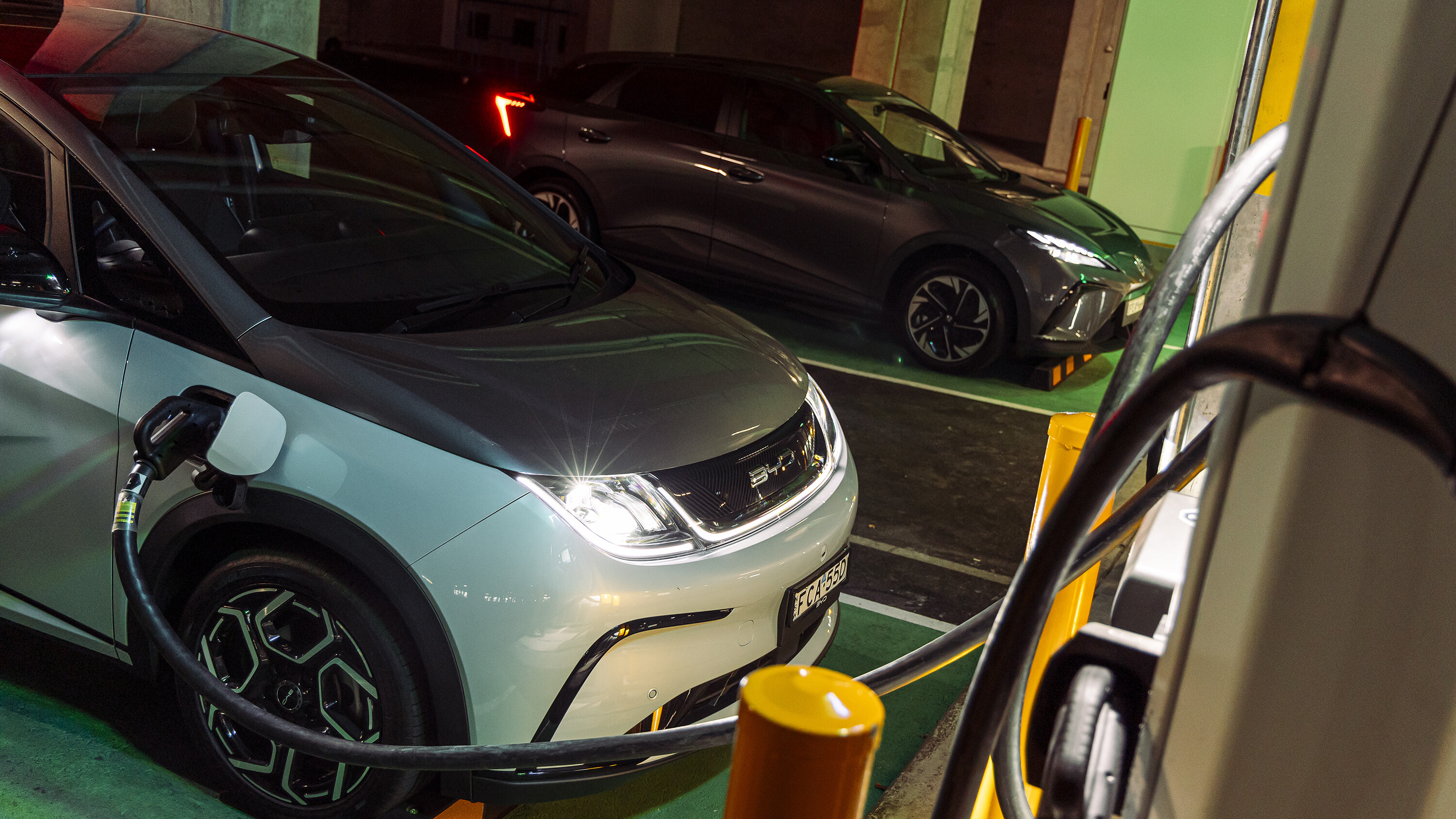
Meanwhile, the MG4 recorded 12kWh/100km on the downhill run (for 514km) and showed 16.2kWh for the whole test, representative of 381km roving range.
The MG’s rapid-charging stats are better though, with peak 140kW DC speeds enough to get it from 10-80 per cent in 26 minutes. We saw a peak of 89kW when rapid-charging the Dolphin (above its quoted 80kW speed) meaning the same fast-charge will take 40 minutes.
As the Dolphin’s battery LFP chemistry is more chemically stable, though, it’s safer to take it closer to full regularly using up to 11kW AC (the MG’s capped at 6.6kW) wall boxes.
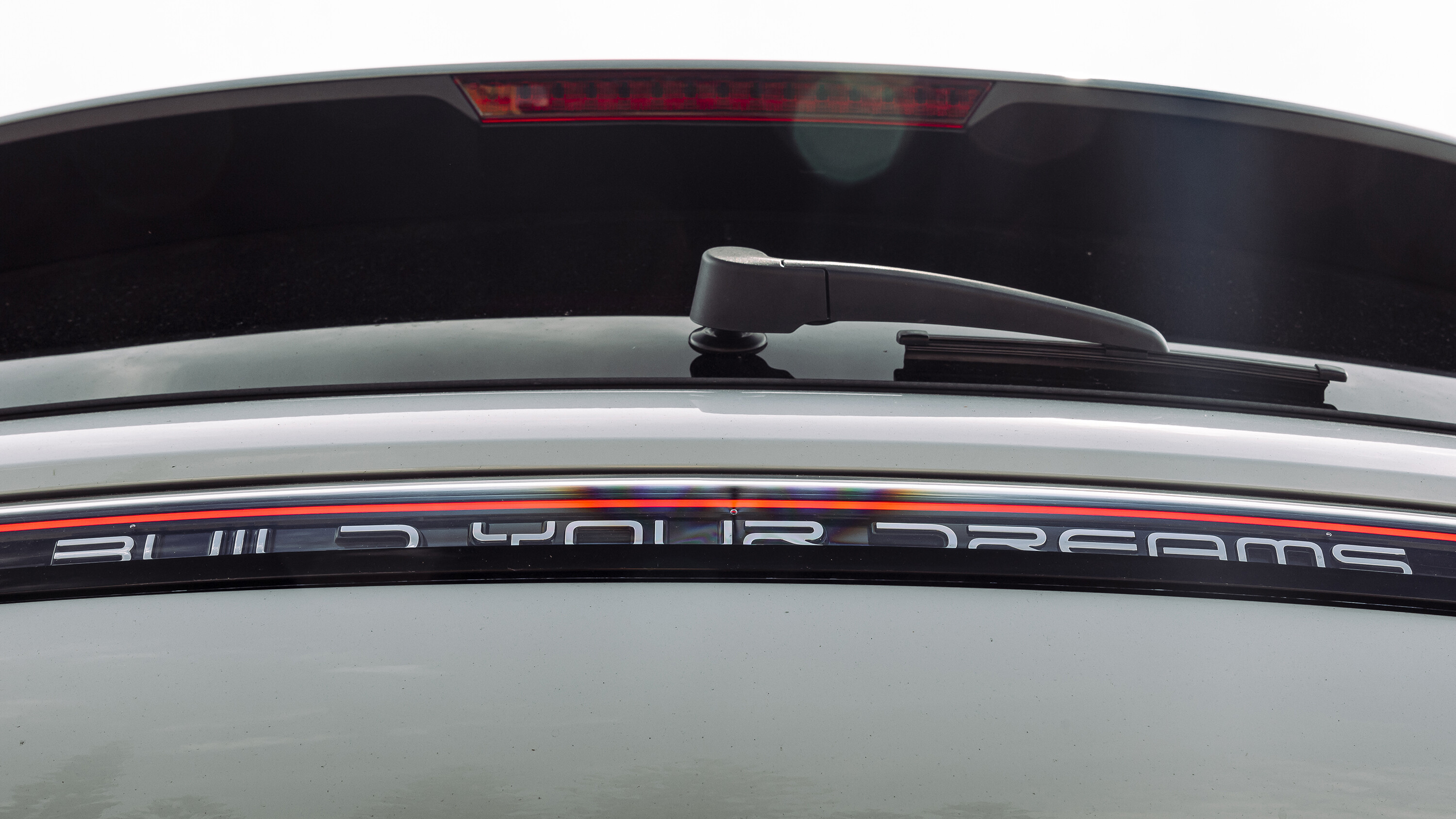
Which is better to drive?
With a van-like driving position and tall, narrow body the BYD’s proportions are ungainly – even if it is the more attractive looker overall – and this is reflected in the driving experience.
The Dolphin is soft and wallowy with minimal body control and yet, even though this variant has multi-link rear suspension (teamed with front struts), it falls clumsily into potholes leaving its 205/50 R17 Linglong Comfort Masters (with cutesy OEM Dolphin stamping) to deal with sharp edges.
Then there’s the 2.8-turn lock-to-lock steering. We’re not looking for the granular feel or high-def tread-squirm here, just a light and unobtrusive system which the Dolphin’s is not. Around the straight ahead it’s sticky like treacle making it difficult to make small corrections for cambers and crosswinds on the motorway yet becomes fingertip light off-centre.
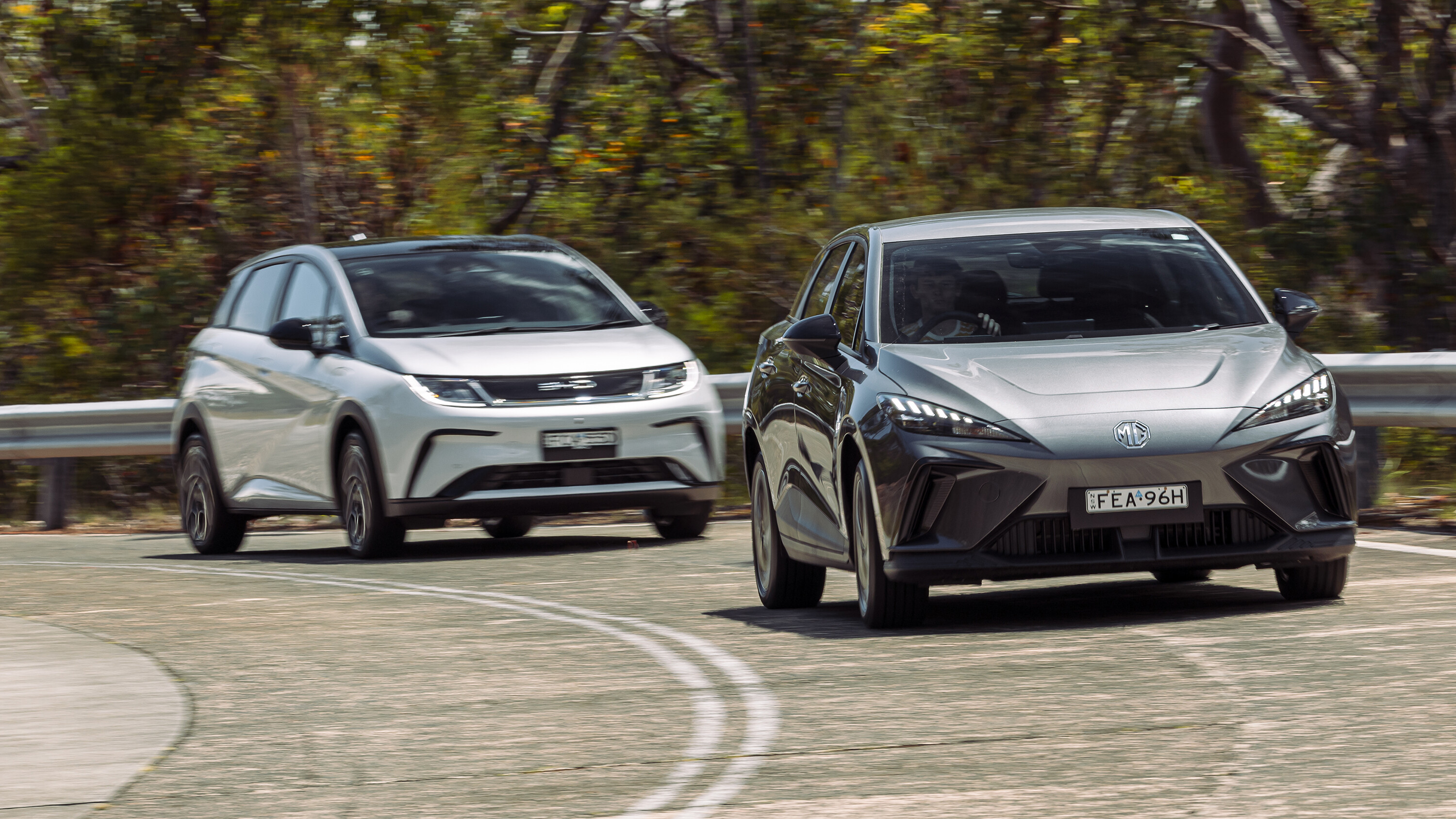
The BYD’s turn of speed is impressive, though, that front-mounted 150kW/310Nm motor drags the 1658kg Dolphin to 100km/h in 7 seconds (claimed) – that’s warm hatch quick.
There’s good overtaking acceleration, too, with more puff at higher speeds than the MG. Finesse is lacking at full noise, with the Dolphin’s grunt enough to make the front end axle tramp and the Linglongs screech at any more than about half throttle.
The braking performance is about as convincing as the tyre grip with a pedal that feels mushy underfoot amplified by the clumsy blending of regenerative and physical retardation. There are two regen modes though neither promises a one-pedal drive.
The MG has more regen settings that can be tethered to one of the two configurable steering wheel buttons (same story with the four drive modes: Eco, Normal, Sport and Snow) and a pseudo-one pedal mode can be selected within the main menus. Its brake pedal feel is natural and even preferable to a Toyota hybrid’s stoppers.
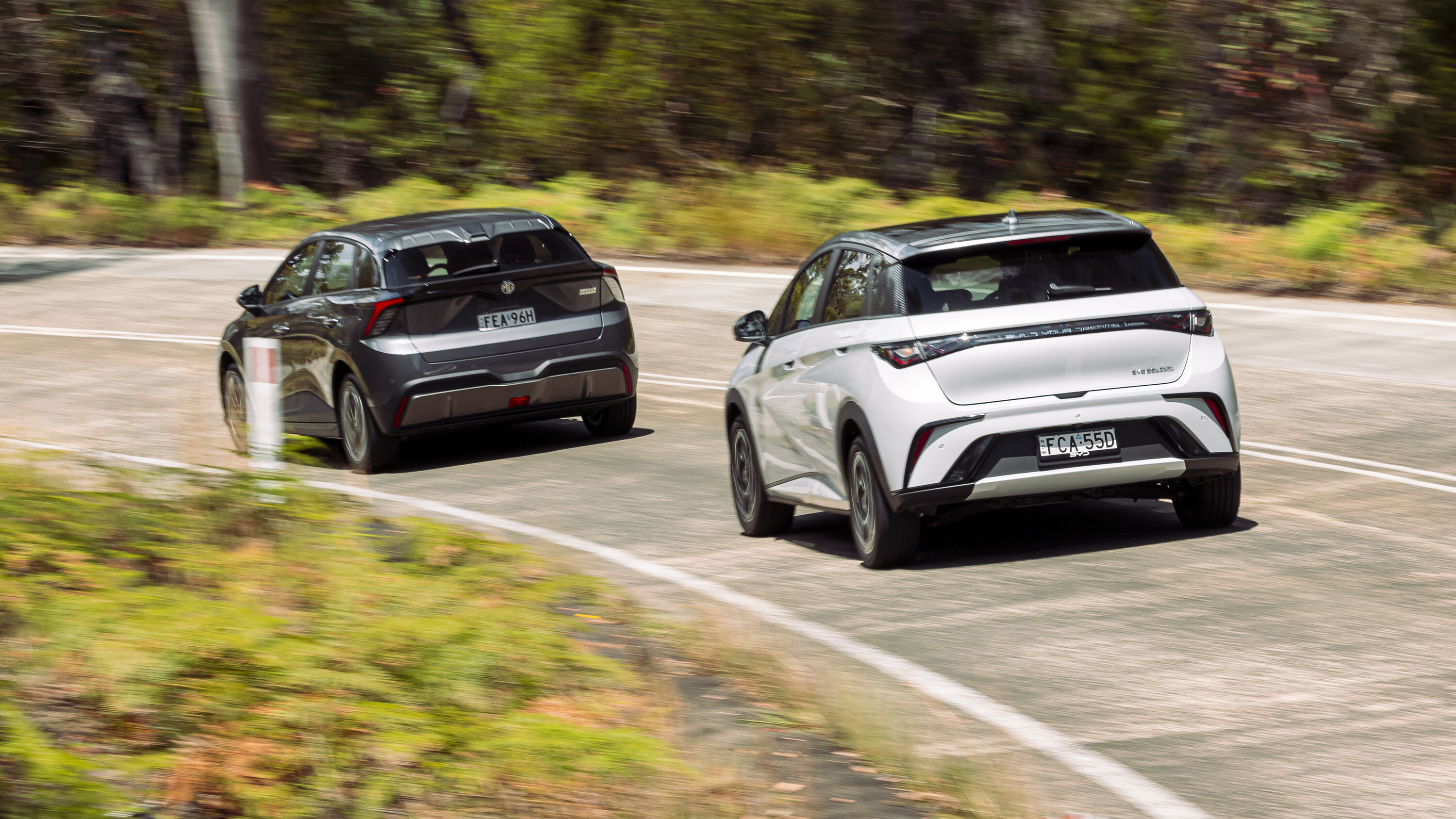
It’s a little slower (though no slouch) nailing 100km/h in 7.7 seconds thanks to 100Nm less from a rear-mounted electric motor. But the whole process is far calmer, as is the experience on our twisting country road.
Where the Dolphin’s appallingly underdamped body shimmies through corners and porpoises over bumps, the sophisticated MG 4 steers as accurately as any combustion-engined family hatch – and that’s meant in a most complimentary way.
It’s pleasant around town, too, with decent comfort aided by soft 215/50 R17 Continental Premium Contact C tyres that keep road noise to a minimum.
As for critiques, there were occasions on wet roads where the torquey MG4 dished out surprise oversteer, we found the light steering to be lifeless, and the multi-link rear-end’s ride around is a little bouncier than we’d like, but on the whole, the MG4 is a peach.
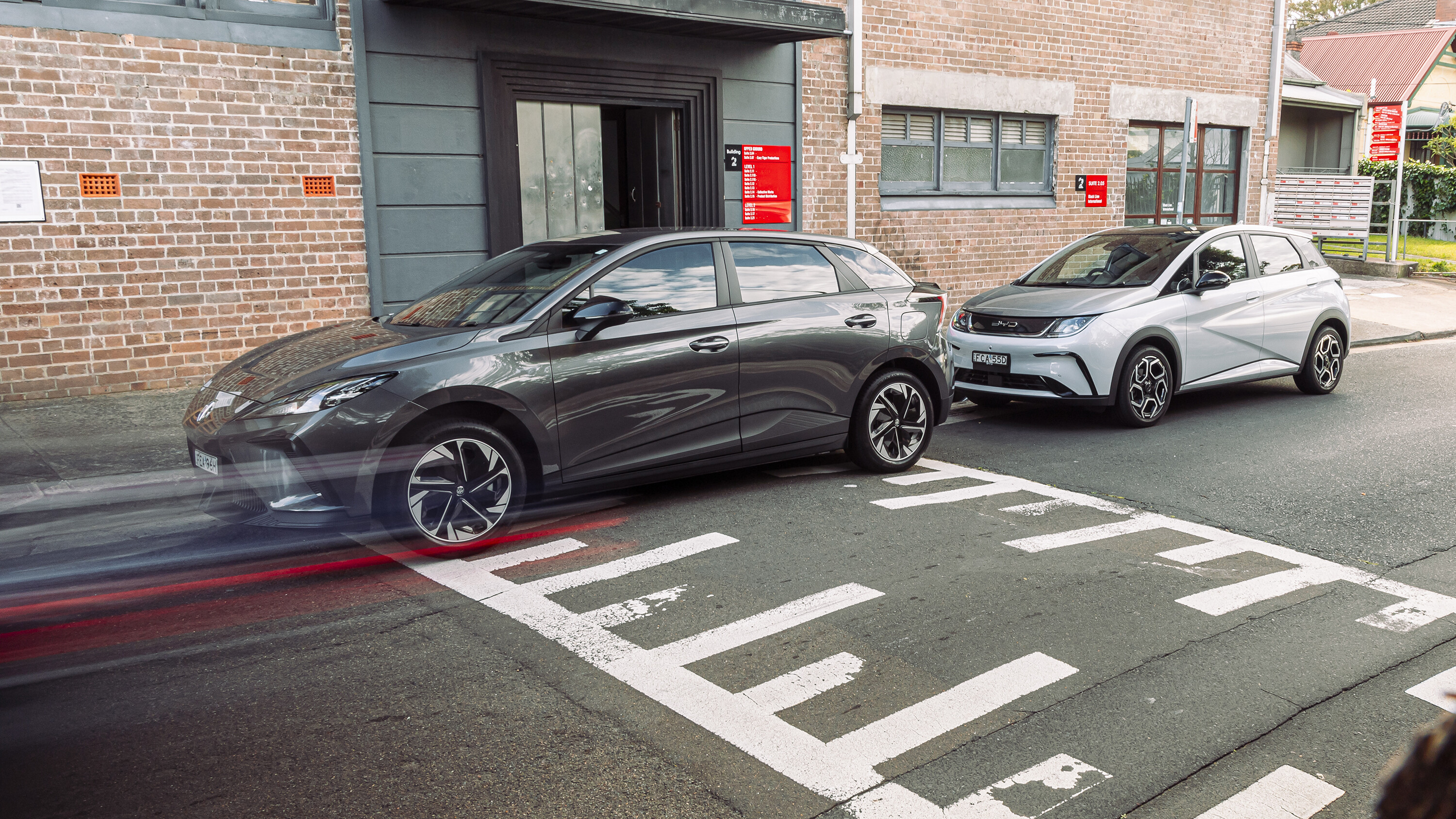
The MG4’s tuning circle is superb though rear visibility is impeded by a tiny rear window and comedically large headrests with only a low-resolution reverse camera that pales in comparison to the BYD’s spectacular interactive 3D system.
MG doesn’t equip the Excite with blind-spot monitoring or rear cross-traffic alert, either, and the driver-aid tuning leaves something to be desired.
Where the Dolphin cajoles the driver back into the lane with more subtle inputs, the MG4’s lane-keep assist is snatchier. Both car’s front collision warning and speed limit assist with their associated beeps were also intrusive during testing.
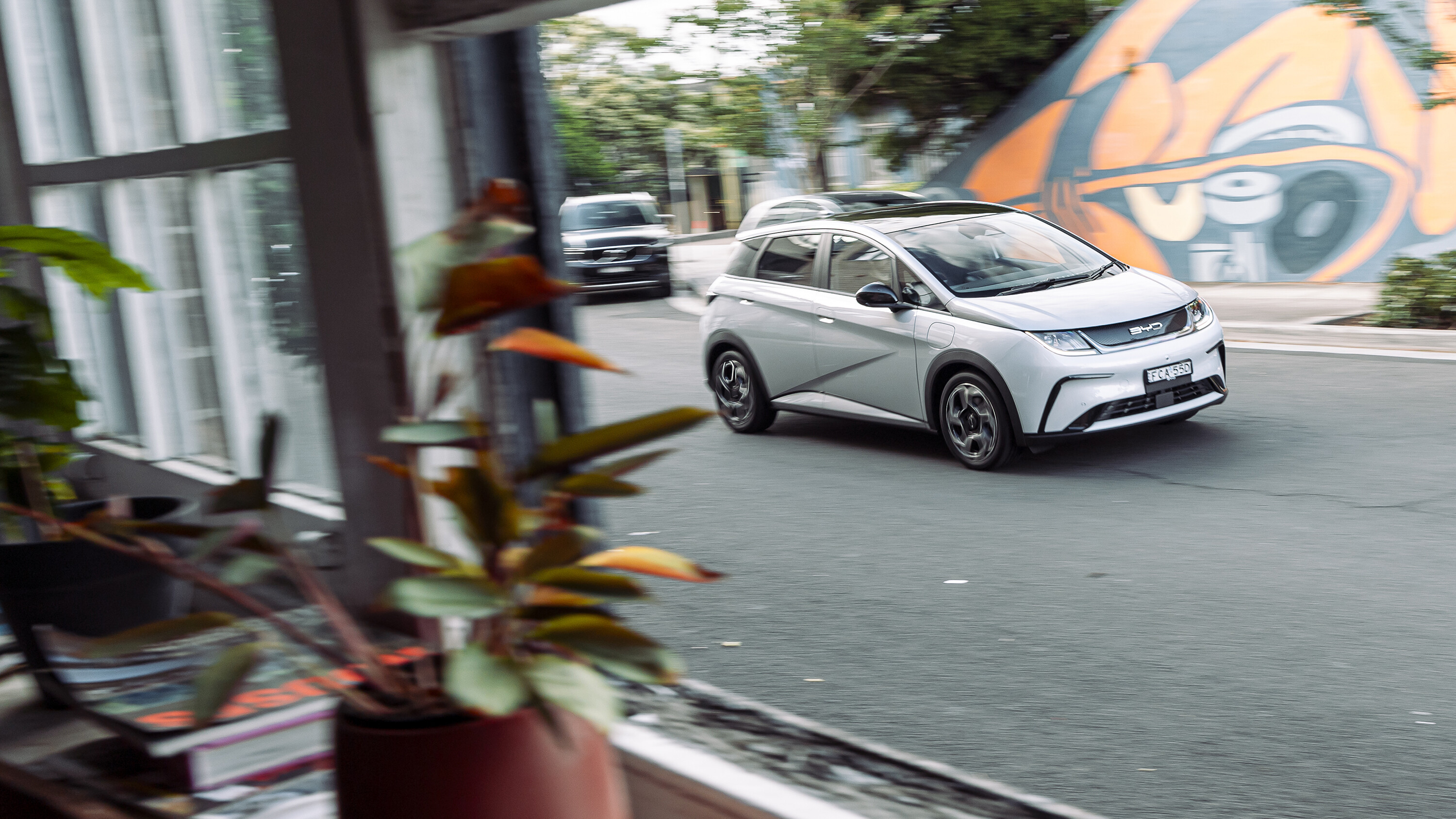
Both vehicles have adaptive cruise control systems that interface with lane-tracing for semi-autonomous driving in motorway and highway situations.
They are okay at best and still require driver attention when operating. The MG 4 was awarded five ANCAP stars in August, while the Dolphin scored its rating in October – both under 2022 protocols.
If you’re looking for a sharp-value electric runabout for the city that’s stacked with technology, good looks, and gimmicks to entertain your friends, the quirky Dolphin delivers.
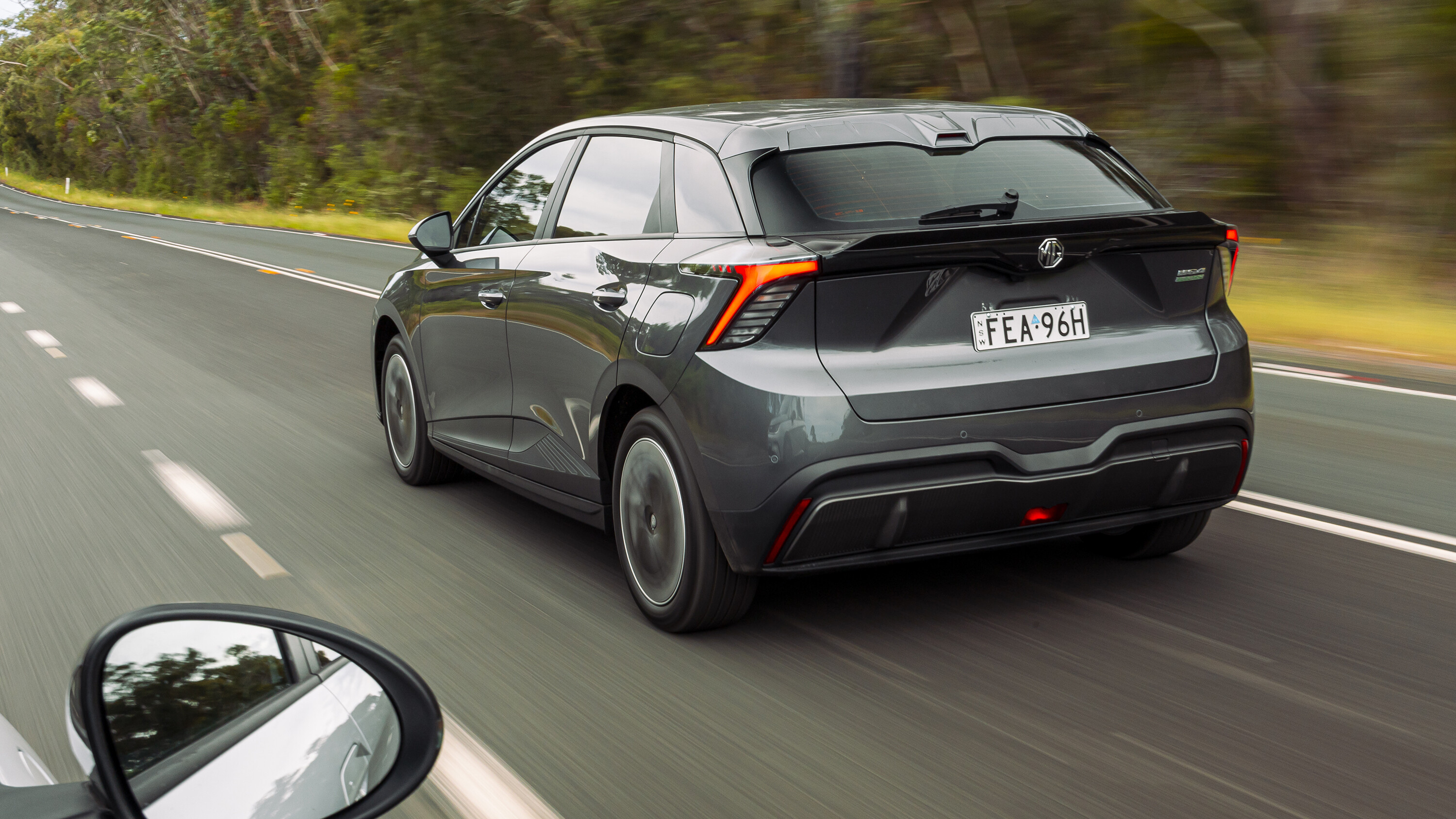
But electric cars have gone past the early-adopter era of Mitsubishi i-Mievs and BMW i3s. Where the Dolphin conforms to EV stereotypes, the MG kicks them back into the ocean where they belong.
The MG4 is a complete vehicle engineered to stand up against tough Japanese, Korean and and European rivals. There are still some gripes, such as the clunky touchscreen and awkward starting procedure (neither of which other companies like Volkswagen are immune to), but crucially its excellence runs far deeper than you’d expected of a bargain basement EV.
Much like Tesla’s Model 3, the MG4 has the potential to define the next decade of family cars – this truly is an electric alternative to a Corolla, i30, or Golf.
If any of the terms in this section have left you scratching your head, these articles will help bring you up to speed!
- What is a Powertrain or Drivetrain?
- Power vs torque
- Car suspension explained
- Automatic transmissions (‘gearboxes’) explained
- Chassis control systems explained
- Car vs Ute vs SUV: How the vehicle you buy should guide the way you drive
- What is the WLTP emissions and range test?
MG4: 8.5/10
Things we like
- Spacious, practical cabin
- Rewarding chassis
- Fast DC charging
- Smooth ride
Not so much…
- Awkward start procedure
- Lifeless steering
- Clunky infotainment system
BYD Dolphin: 7.5/10
Things we like
- Interior presentation
- Powerful and customisable infotainment system
- Very efficient
Not so much…
- Desperately lacking body control
- Tight headroom in the back
- Gimmicky tech
Specifications: MG4 v BYD Dolphin
| MG 4 Excite 64kWh | BYD Dolphin Premium | |
|---|---|---|
| Price | $44,900 | $44,890 |
| Layout | Single-motor RWD | Single-motor FWD |
| System power | 150kW | 150kW |
| System torque | 250Nm | 310Nm |
| Gearbox | single-speed reduction gear | single-speed reduction gear |
| Body | 5-door, 5-seat small car | 5-door, 5-seat small car |
| L/W/H | 4287 / 1836 / 1504mm | 4290 / 1770 / 1570mm |
| WB | 2705mm | 2700mm |
| Track (front/rear) | 1550 / 1550mm | 1530 / 1530mm |
| Weight | 1648kg | 1658kg |
| Boot capacity (VDA)) | 350L | 345L |
| Battery usable (gross) | 62.1kWh (64kWh) | 60.4kWh |
| Driving range | 450km (WLTP) | 427km (WLTP) |
| Charging (AC/0-100%) | 6.6kW / 9h | 11kW / 6h 12m |
| Charging (DC/10-80%) | 140kW / 26m | 88kW / 40m |
| Suspension | Front: Struts, coil springs, anti-roll bars / five-link independent, coil springs, anti-roll bars | Front: Struts, coil springs, anti-roll bars / multi-link, coil springs |
| Steering | electric rack-and-pinion (2.9 L-L) | electric rack-and-pinion (2.8 L-L) |
| ANCAP rating | Five-stars (2022) | Five-stars (2022) |
| 0-100km/h | 7.7sec (claimed) | 7.0sec (claimed) |


